All you need to know now the kids’ new term has started See page 7



All you need to know now the kids’ new term has started See page 7




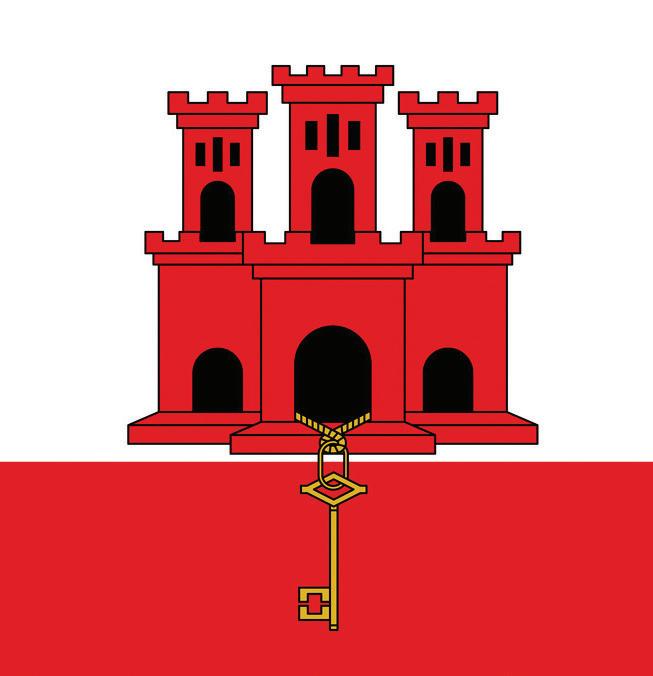
Agreement to usher in era of new prices – ‘somethings will be more expensive, other things will be cheaper’
FABIAN Picardo has warned that the incoming new agreement with the EU will see changes in prices –‘but there will always be a balance’.
Speaking to the Olive Press after giving a rousing speech to the sea of red and white that flooded Casemates Square yesterday, the Chief Minister assured that the deal is ‘a huge win for Gibraltar.’
“We will have access to a market of 480 million people to sell our wares,” he said.
“In some instances, Gi braltar will be cheap er than it is today, in some instanc es it will be slightly more expensive, but this is always going to be a balance.”
“I think that economies of scale will mean that our traders can sell more, and therefore they can buy more, and therefore they can get better prices.”
By Adam Husicka
The day was a bold display of Gibraltarian identity and the people’s choice to remain under British rule.
The prevailing mood among the crowds was one of reassurance, pride, and cautious optimism.
A number of speakers took the opportunity to address the opportunities and anxieties surrounding the treaty, which will see the Rock join the Schengen common travel area – but not the Schengen zone itself.

IMPRESSIVE: This year saw an innovative drone show instead of fireworks
The Chief Minister was speaking as thousands attended the Gibraltar National Day celebrations that marked the 58th anniversary of the 1967 sovereignty referendum – the first since the landmark agreement with the EU was announced.
Picardo was equally emphatic when pressed on the implications for the Rock’s security once the border is removed.
“I understand that fear, but it’s entirely misconceived. We will be able to have even better control using electronic means of who’s coming into Gibraltar than we have today.”
He pointed out that even today people wander into Gibraltar across the fence, ‘which is easy to break through.’
“They do, every night and every day

– we have to repair the fence after it’s been broken in the evenings.
“I’m very confident that working with the RGP, the Borders and Coast Guard Agency and Customs, will be able to ensure that Gibraltar remains just as secure as it is today, if not even more secure in the future.
He added: “I have a 7-year-old daughter, a 10-year-old boy, a 13-year-old boy, I’m never going to do anything that makes Gibraltar in the slightest bit insecure.”
This optimism was echoed by Amanda Martin, the Labour MP for Portsmouth North and Chair of the All-Party Parliamentary Group for Gibraltar.
A YOUNG man found battered to death on an isolated ‘hippy’ beach has been named as 23-year-old Mario Belmonte, the Olive Press can reveal.
His bloodied body was discovered at ‘an isolated cove’ near trendy Las Negras, in Almeria’s Cabo de Gata Natural park.
Investigators are exploring whether his murder may have been linked to the local drug trade, with one theory pointing to a dispute involving so-called ‘hippy dealers’ who operate from San Pedro beach.
Sources close to the victim’s family have told us detectives are interested, in partic-
ular, to speak with four men seen getting out of a car on the night of the killing.
Police have since seized CCTV from around Las Negras in an effort to identify the suspects.
“There are so many police here now – everyone is very anxious to find out what happened,” said the German family friend.
The expat source added Mario appeared ‘nervous’ in the days before his death.
“He was planning to go to Mallorca this month,” she revealed. “He had been quite nervous and we didn’t know why.”
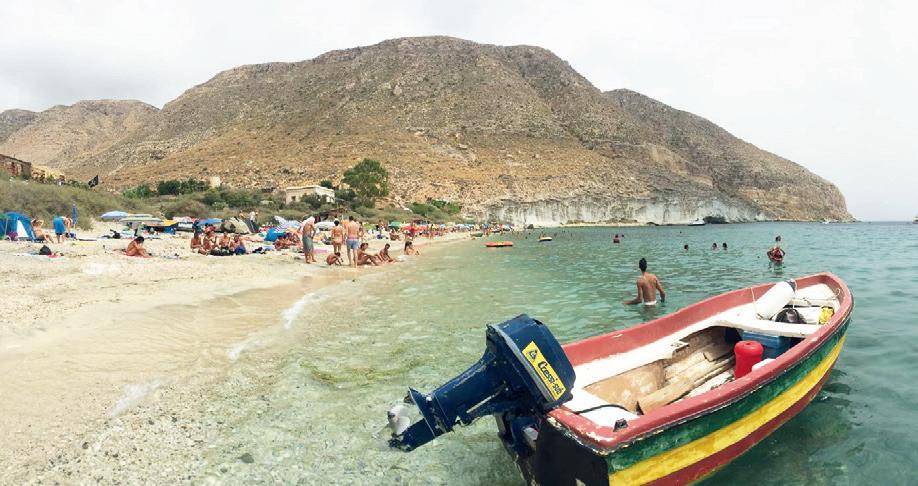
Mario had just spent two months living at secluded San Pedro beach, which has a long-standing reputation as a hideaway for hippies.
The residents - often numbering hundreds, mostly from Northern Europe - have lived in the old ruins of San Pedro castle for decades. Located within the natural park, it is only accessible on foot or by boat. Police have so far not commented publicly on the case.
She told the Olive Press after her speech that the agreement was a crucial step forward, ending the ‘stalemate since Brexit’ during which ‘nobody thought about Gibraltar’.
Martin highlighted that the positive effects are already being felt, noting she had met with the business community where ‘investment is happening already’.
She also stressed the human importance of the treaty, which promises to heal divisions for families split by the border and ease the daily lives of thousands who cross to work or access services like the hospital.
For many Gibraltarians, the fundamental question has always been one of sov-

ereignty.
Charlie Bishop, a founding member of the Self-Determination for Gibraltar Group which organised the first unofficial National Day rally, provided a vital grassroots perspective.
He felt it was important to ‘make a stand this year because of the deal to show that we’re still Gibraltarian, that this is still our home, and it’s not up for negotiation’.
Yet, he firmly supports the new treaty.
“Personally, I think it’s a good thing because we haven’t ceded anything on sovereignty or anything like that”.
Bishop sees the deal as a ‘no-brainer’ for a populace that overwhelmingly voted to remain in the EU.
“We’re going to have a more normal and natural relationship with our neighbours, which is how we should be,” he remarked, comparing the future border to the open frontiers between Spain and France or Portugal.
The message from this year’s National Day was clear.
Gibraltar stands firm in its British identity, a choice celebrated with deep-rooted passion. But it is also looking forward, ready to embrace a new era of European cooperation, confident that its cherished sovereignty remains uncompromised.




A PAIR of 23-year-old men have appeared in court accused of fatally stabbing a 21-year-old man on Malaga’s Alameda de Capuchinos. Police say the suspects knew the victim.
Tourist killed
SPANISH woman
Matilde Munoz, 72, has been murdered in her Lombok (Indonesia) hotel room during a robbery. Two men, including a hotel worker, have confessed and been arrested for premeditated murder.
Drug arrest
A 45-year-old woman carrying 21 wraps of cocaine and heroin plus €1,220 in cash, has been arrested in Estepona’s old town during a police clampdown on street dealing.
‘Shaman’ scam
A 55-year-old fake healer in Pontevedra has been arrested for convincing women they needed to have sex with him to be ‘cured’. He faces indecency charges but was released on bail.
SEXUAL crimes in Estepona have rocketed, with assaults involving penetration jumping 133% in the first half of 2025.
New figures from Spain’s Interior Ministry show a total of 2,783 reported offences between January and June, a 20.4% rise on the same period last
year. Conventional crime rose nearly 23%, with sharp spikes in vehicle theft (+69%) and drug trafficking (+30%). Despite the surge, robberies with violence fell 40% and burglaries
dropped 17.5%.
By contrast, Marbella saw crime rise just 2.2%, while sexual offences fell 11.8%. Malaga city remained stable overall but saw a 75% rise in attempted homicides.
The data paints a worrying picture for Estepona’s once-safe streets.
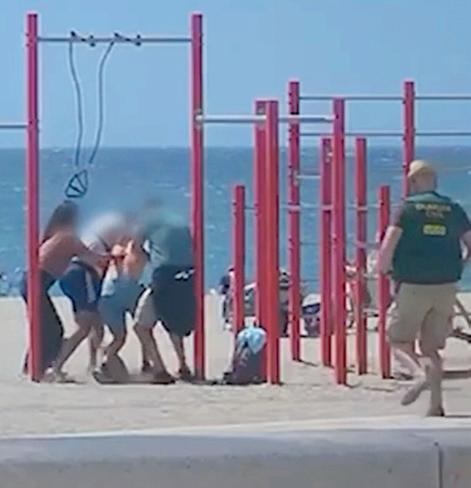

A MUSCLE-BOUND Scot who
faked his own death and fled to Spain has been convicted of two rapes in Scotland.
James Clacher, 57, vanished in 2022 after dumping his car, a suicide note, and smashed bank cards near Loch Long in Scotland.
But instead of ending it all, he snuck onto a lorry, crossed the Channel, and cycled his way to Spain - surviving on berries and puddle water along the
SHE looks like your nan, but don’t let the walking stick fool you - a frail-looking pensioner was actually a seasoned sneak-thief.
In a plot worthy of a Netflix drama, Spanish cops have finally collared an 81-year-old serial burglar in Malaga after a string of audacious break-ins at holiday apartments.
Dubbed the ‘Abuela del Resbalon’ (Granny Slip-In), the elderly burglar exploited her harmless looks to glide into buildings without raising eyebrows.
Once inside, she used cut-up pieces of plastic, like old credit cards or shampoo bottle lids, to slip past poorly locked doors and make off with valuables, mostly cash and jewellery. But her reign of sneak-thievery came to a
Scottish bodybuilder who fled to Spain convicted
By Walter Finch
way.
The fugitive embedded himself in Nerja, Malaga, posing as a personal trainer and mixing with British expats. But his secret life came crashing down when eagle-eyed cops spotted
crashing halt when she was caught red-handed by a stunned holidaymaker in the middle of a job.
Local police say the guest came face-to-face with the ‘sweet old lady’ rummaging through drawers.
She allegedly tried to blag her way out, claiming she’d walked into the wrong flat ‘by mistake’.
But police have revealed the octogenarian has a rap sheet longer than a Spanish siesta, and investigators describe her as a ‘historical figure’ in home burglaries.
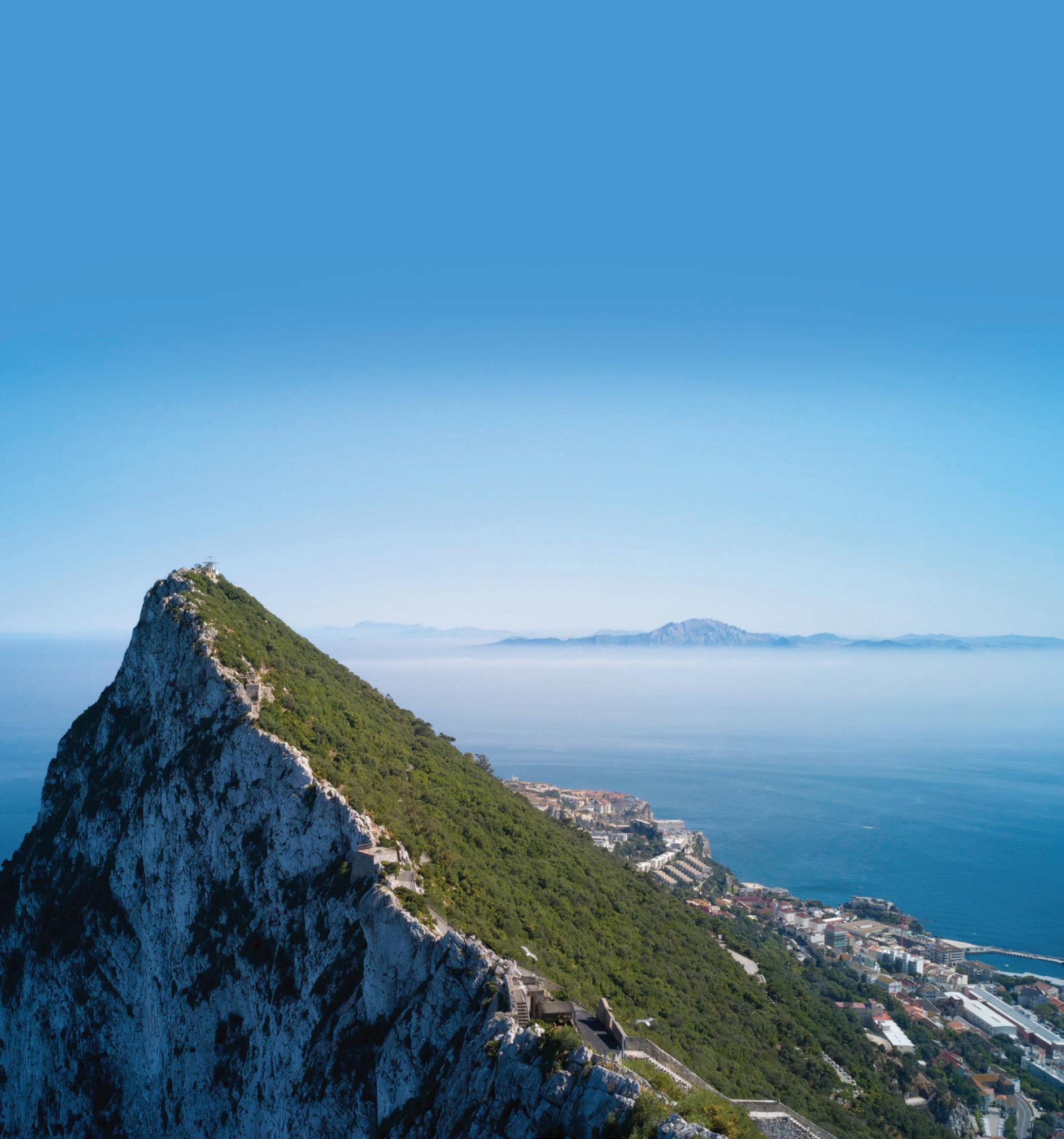
THE Portuguese Navy has been hailed for its quick action after launching a dramatic high-seas operation to stop armed drug traffickers who had hijacked a container ship bound for Malaga.
At least two gunmen with Eastern European accents stormed the Liberian-flagged vessel Odysseus shortly after it departed Vigo port forcing crew members into the engine room at gunpoint while they searched for the stashed cocaine.
the former gym boss working out shirtless on beach gym bars. Plain-clothed Guardia Civil pounced on the tattooed Scot, pinning him to the sand.
Clacher was held in a Spanish jail before being flown back to Scotland, where a detective described him as ‘chatty’ on the flight home.
Back in the UK, Clacher was accused of raping two women he met on Tinder - one in Troon in 2019, another in Glasgow in 2020. He denied both charges, claiming sex was consensual.
He even confessed he once considered paddling to Morocco in a homemade kayak.
He awaits sentencing.
Detective Inspector Bruce Fyfe of Police Scotland said: “It’s difficult to comprehend the distress and suffering Clacher caused the women in this case. I hope this conviction brings them some form of comfort. He will now face the consequences of his actions.”
The container ship, which had previously docked at cocaine-infested Ecuadorian ports including Guayaquil and Posorja, was travelling the notorious South America-to-Spain drugs route when the hijacking occurred. Portuguese naval forces received an emergency alert and immediately deployed a warship, helicopter and specialist assault team to intercept the vessel off the Algarve coast. The military operation successfully regained control of the ship - but the armed attackers had already fled.


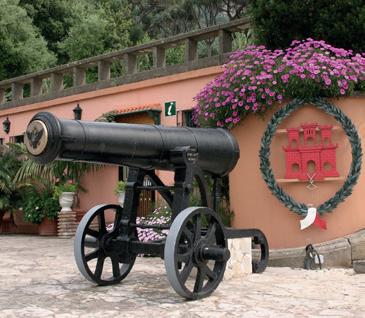

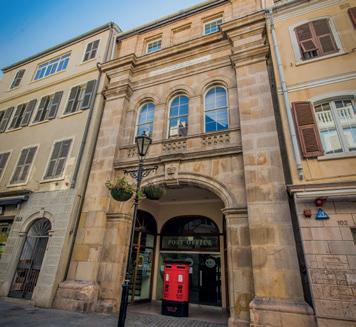
With a UNESCO world heritage site offering 120,000 years of human history and only short drive from the Costa del Sol, enjoy the warmth of the British Gibraltarians and splash out VAT-free in Sterling.
Gibraltar. Sun, sea and history served with a very British twist.
For further information call: Gibraltar Tourist Board +350 200 74950
Or to download a brochure go to: www.visitgibraltar.gi

BRITISH rock band Radiohead have announced they will perform in Spain for the first time in 22 years. Their first live show anywhere for seven years will be at Madrid on November 4, followed by three more shows that week.
But will new World No 1 Carlos Alcaraz make it to play Denmark in the Davis Cup this weekend?
IT is all set to be the hottest ticket for tennis fans when Spain and Denmark go head to head in the Davis Cup this weekend.
A sell out tie at Marbella’s Puente Romano hotel, could herald new World No 1 Carlos Alcaraz’s first outing after winning the US Open at the weekend. But uncertainty now surrounds whether Alcaraz can make it, after he said he was suffering from ‘muscular and mental fatigue’. While the Murcian admitted he ‘feels bad’ about not turning up, he said the threeweek New York tournament had caused ‘tiredness’ and a
By Adam Husicka
‘hectic diary’. It is not as if he needs the money, after picking up the highest ever winning cheque in tennis history, a cool $5 million, after dispatching rival Sinner in a four-set masterclass on Sunday. Either way hundreds of Danish expats queued up to secure one of the much sought after seats at the expanded 5,000 seater venue. Denmark’s chances are heavily relying on Holger Rune, 22, who at World No 8 is one of the brightest stars on the ATP Tour.
Taking place at the Movistar Arena, they will then move on to Italy, Denmark, Germany and the UK
The Madrid dates will be the only Spanish concerts of the tour, which marks the band’s return to live performances after their last tour in 2018.

“He is a very exciting young talent who has beaten Alcaraz a few times,” said Marbella businessman Janus Nielsen, whose company AnyTech 365, sponsored three ATP tournaments at the venue from 2021 to 2023.
“I actually gave both Rune and Carlito wild cards in 2021 as they were such exciting talents,” he told the Olive Press.
“Carlito was just 16 and at 150th in the world, while Rune was at 200th.
“It is amazing how they have

developed and in terms of wins they are now neck and neck at about two each.
“The first time I watched Carlito play in our tournament in Marbella, an Austrian coach who helped me organise it said: ‘that boy will one day be World No 1’. He was right.
“He’s an extraordinary talent.”
The question remains whether captain David Ferrer will be able to count on him, alongside Olympic champion Marc Lopez.
COME on people what’s going on here? I’m pretty much convinced with the idea that the UK is suffering from a huge lack of common sense, but what the hell is going on when it comes to ‘el sentido comun’?
The police say they have arrested 48 suspects relating to arson causing wildfires that have consumed more than 400,000 hectares of land across Spain. They also have 134 suspects under investigation. Again, what the hell is going on here!?
The headline suggests hundreds of firebugs running about the place setting fires for the sheer joy of seeing wildfires racing though the country, destroying whatever gets in their way. But looking at the details of those arrested the truth is more Homer Simpson than Herostratus. And, if you don’t believe me, have a think about the two idiots who set off an uncontrollable blaze in A Rua (Ourense). They were trying to strip the plastic coating off a load of stolen copper cable… in open country with petrol and a blow torch.
Or there is another pair of rocket scientists who it seems wanted to even up the odds between themselves and the local wildlife, so they could more easily hunt them down. Yep, these s**t hunters decided to burn off the undergrowth, so their prey had nowhere to

JENNIFER Lawrence will be honoured with a lifetime achievement award at Spain’s San Sebastian Film Festival this month - and break a record.
The 35-year-old Oscar-winner is expected to fly into the Basque resort to pick up the coveted Donostia Award on September 26 – making her the youngest star ever to receive it.

Dozens arrested as brainless crooks spark wildfires with blowtorches, stolen cables and hunting stunts
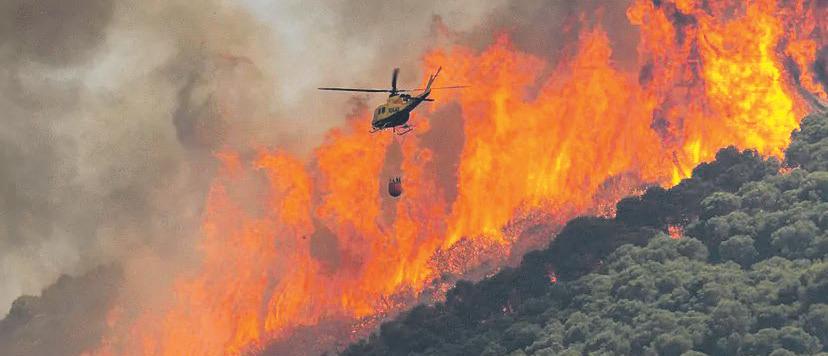
hide. I’ve never understood hunting animals with guns. Where’s the sport in that? But when the technological advantage isn’t enough, what kind of lame brain puts a match to nature to stack the deck even more?
Anyway, what we seem to have here is not an epidemic of firebugs; it’s a load of crazies, some on the criminal spectrum, who have no idea of the consequences of their actions. Come on people, it’s 40 degrees, hotter in some areas. Once a small blaze gets going it becomes a big huge and dangerous wildfire. I never thought I’d be saying this, but Europe is getting hotter, and we need to get more sensible about the way we live. Even criminals need to be careful not to destroy nature.
In the UK temperatures are now also regularly hitting 100 degrees (in old money). There are signs everywhere telling people not to light bonfires or barbecues in open spaces. The difference is in Blighty the weather has traditionally been so miserable that outdoor cooking (or even a bit of criminal activity) on a flame has never really been a thing. Brits don’t barbeque unless they’re on a patio with a gas powered grill.
So how about people of all races and persuasions stop setting fires for lunch, criminal pursuits or ‘evening’ up the odds with the local rabbit population. Whether you agree with the global warming crisis theory or not, it’s getting bloody hot lately, how about people get a brain and stop lighting up the countryside?
HE’S the cyborg assassin who made ‘I’ll be back’ and ‘Hasta la vista, baby’ two of the most iconic lines in movie history. Now Arnold Schwarzenegger really will be back… in Spain.
Festival bosses have called Lawrence ‘one of the most influential actors of our time’, pointing to her smash-hit turns in The Hunger Games and Silver Linings Playbook, which earned her an Oscar at just 22. Her latest film Die, My Love, which she stars in and produced, will be screened straight after the ceremony.

The Austrian-born Hollywood icon first shot to superstardom in Conan the Barbarian - which was shot in Ma drid, Cuenca and Almeria.
‘I’M BACK!’
He has now been confirmed as the guest of honour at the very first San Diego Com ic-Con Malaga later this month.
The event, running from September 25 will see more than 120,000 visitors pack into 82,000 square metres of geek heav en, with over 300 hours of exclusive content.


SPAIN is on high alert after new cases of West Nile virus were detected in swarms of mosquitoes buzzing around Andalucia.
Health chiefs confirmed the bloodsuckers carrying the potentially deadly disease were trapped in two small towns near Sevilla, as well as Moguer in Huelva.
The infected mozzies were caught more than 1.5 kilometres from homes – but that hasn’t stopped alarm bells ringing, with all three towns slapped with a ‘high risk’ warning.
Four other places remain under special watch: Huelva, El Pedroso in Sevilla, plus the Almeria towns of Pulpi and Mojacar.
So far, no human cases have been confirmed in 2025 despite 274 people being tested. Some 11 people died in Andalucia from the virus last year, with more than 100 infected.
embargo on weapons to Israel called as Spain officially dubs Gaza action as ‘genocide’
By Adam Husicka
SPAIN has become one of the first countries to openly describe Israel’s war on Gaza as ‘genocide’.
The government has also now ordered a total embargo on all weapons to the country, as it intensifies its offensive on the Palestinian enclave.
Prime Minister Pedro Sanchez called out Israel saying it had displaced almost two million and left ‘hundreds of thousands facing hunger’.
And while it had the right to defend itself, ‘bombing hospitals and starving children’ cannot be justified as self-defence. It is the first time Sanchez has
MALAGA’S reservoirs are in good shape, with no new drought restrictions expected despite a scorching summer.
Patricia Navarro of the Junta confirmed the province’s reservoirs hold over 317 billion litres of water - 51.9% of capacity - compared to 200 billion litres less last year.
Current usage limits remain: 225 litres per person daily in Malaga and Axarquia and 250 litres on the western Costa del Sol.
Key reservoirs like Limonero (57.3% full) and La Concepcion (77%) are performing well.


used the word ‘genocide’ to describe the offensive, a term previously avoided by the Spanish government.
Foreign Minister Gideon Saar immediately accused Sanchez of antisemitism and announced ministers Yolanda Diaz and Sira Rego would be banned from entering Israel.
The dispute highlights growing tensions between Madrid and Tel Aviv after Spain became one of the first European countries to formally recognise Palestine earlier this year.
As part of the new measures,
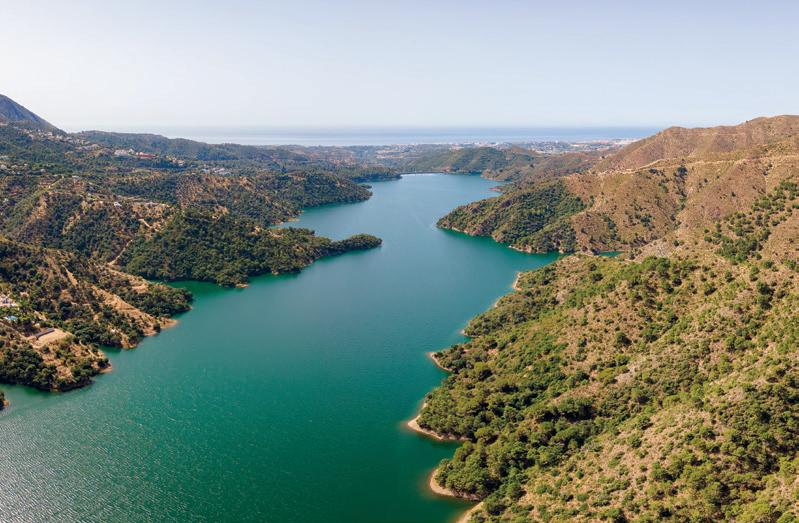
ships carrying weapons or fuel for the Israeli army will not be allowed to dock in Spanish ports.
Meanwhile all aircraft transporting defence equipment will not be allowed to fly through Spanish airspace.
Individuals accused of direct involvement in the conflict, including government officials and military figures, will be prohibited from entering Spain.
The government will additionally restrict imports of goods made in Israeli settlements in the occupied West Bank and scale back consular services for

Spanish citizens living there. Sanchez announced increased support for Palestinians, including new cooperation projects with the Palestinian Authority, an additional €10 million for UNRWA, and humanitarian aid for Gaza totalling €150 million.
He admitted Spain cannot stop the war alone but said the country has a duty to act.
“Spain does not have nuclear weapons or aircraft carriers,” he said. “But we can show leadership, and we can make clear which side of history we stand on.”
HORRIFYING new discoveries have been made at a mass civil war grave in inland Malaga. Archaeologists recovered the remains of 73 people executed during Franco’s bloody takeover of Spain in the 1930s.
The first phase of the dig, lasting two and a half months, revealed something rarely seen in other exhumations – over 20% of the victims were women. Normally, women account for just 3-5% of those found in Civil War graves.





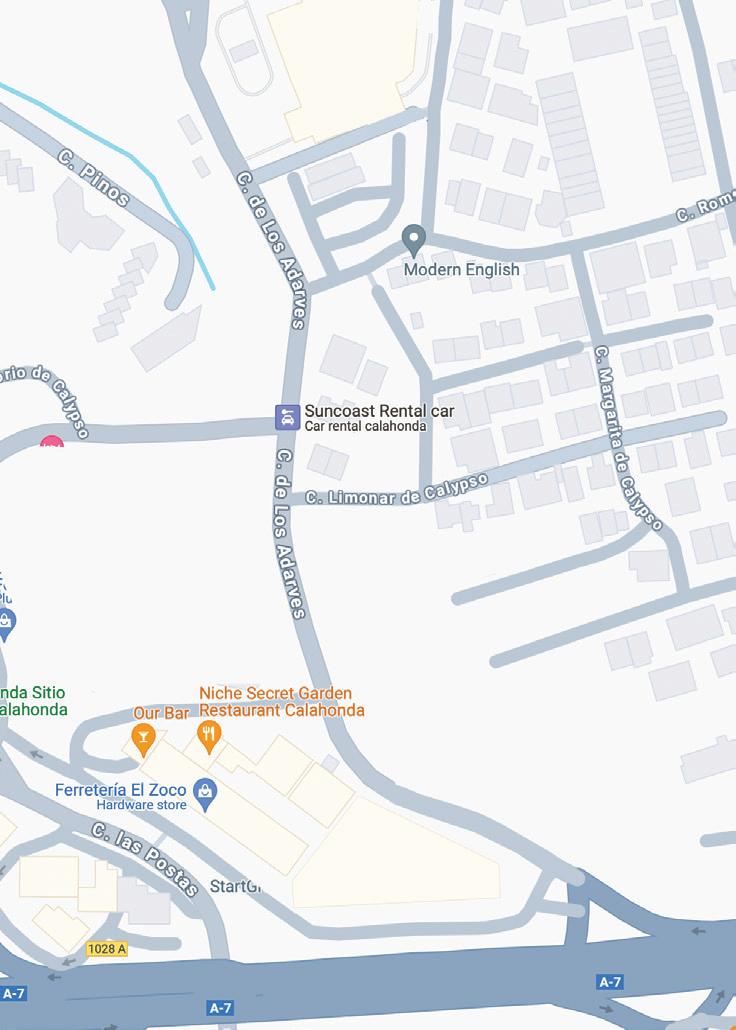



THREE young immigrants were beaten up by masked attackers allegedly linked to a neo-Nazi group with British connections.
A pair of hooded men assaulted two random minors and an accompanying adult who were staying in the Madrid centre, with one child requiring hospital treatment.
The attack on September 1 was applauded by Nucleo Nacional, a fascist organisation whose members are believed to be behind the assault.
The group are notorious for hiding their identities and wearing balaclavas, but were recently revealed as led by brothers Ivan and David Rico.
According to the British anti-racist magazine Spotlight they are the sons of a wealthy businessman who previously served as a councillor for Spain's Popular Party.
They have close links to the farright Vox party and direct ties to British Nazis through Isabel Peralta, (right) the European correspondent of the notorious UK publication, Heritage and Destiny.










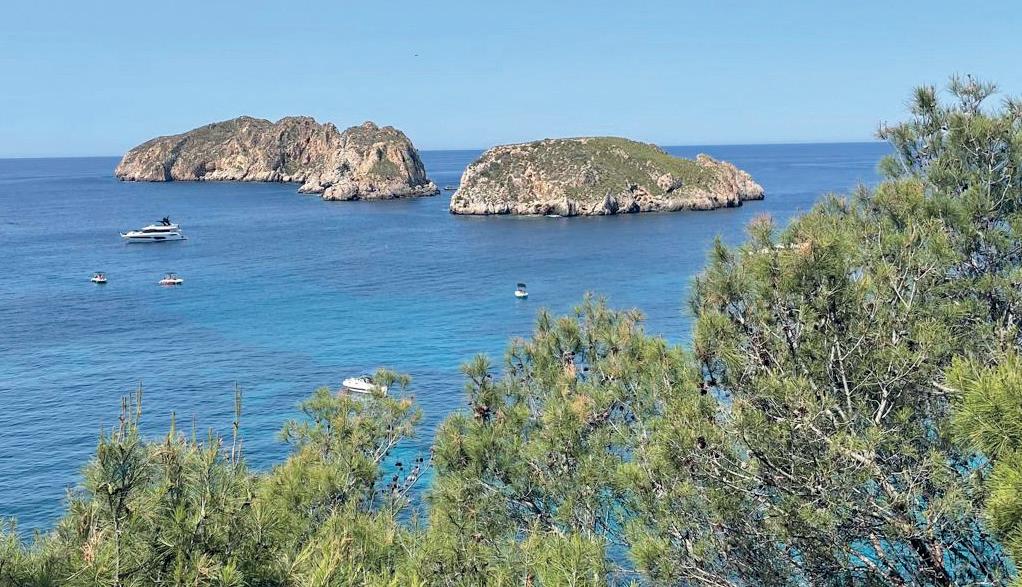
MALLORCA’S millionaire yachts and thrill-seeking jet-skiers are being reined in as the Balearic government launches the Illes del Ponent Marine Reserve – a vast new protected zone covering 2,300 hectares of ocean off the island’s southwest coast. The move – made official under Decree 26/2025 – merges and expands existing reserves around El Toro, Islas Malgrats and Illa del Sec, with a big focus on protecting wildlife, cutting marine noise, and putting a leash on careless tourism.
And if you’re planning a joyride in these waters – think again. New rules mean speed limits, jet ski bans, and strict diving regs are now in full force. It’s bad news for speed demons and watersports warriors.
● Speed Limits: Boats must now slow right down to 3–6 knots in protected zones around El Toro, Malgrats, and El Sec – unless it’s a genuine emergency. It’s all about cutting underwater noise and giving marine life a break.
● Jet Skis BANNED: No more roaring around on personal watercraft – they’re completely banned in the core protected areas.
● Anchoring Rules: Recreational boats must stay 150 metres away from traditional fishing nets – or risk penalties.
The creation of the Illes del Ponent Marine Reserve is part of a bigger
BOATERS off the coast of Spain have been left shaken after two vessels were rammed by killer whales in a double attack just minutes apart. The incidents happened near O Grove, Galicia, where a pair of orcas - one reportedly seven metres long - slammed into boats, destroying at least one rudder and leaving sailors calling for urgent help.
Spanish maritime rescue teams rushed to the scene on Wednesday after the first attack damaged the rudder of a vessel named San Pedro. Just as the crew were being towed back to port, another emergency call came in to report that a second boat had also been struck, this time suffering a leak.
One crew member admitted: “We were really scared when we realised the orcas were hitting the boat.”
It’s just the latest in a string of orca-related incidents in Iberian waters. In fact, hundreds of similar encounters have been recorded since May 2020, sparking global headlines and growing concern among sailors.
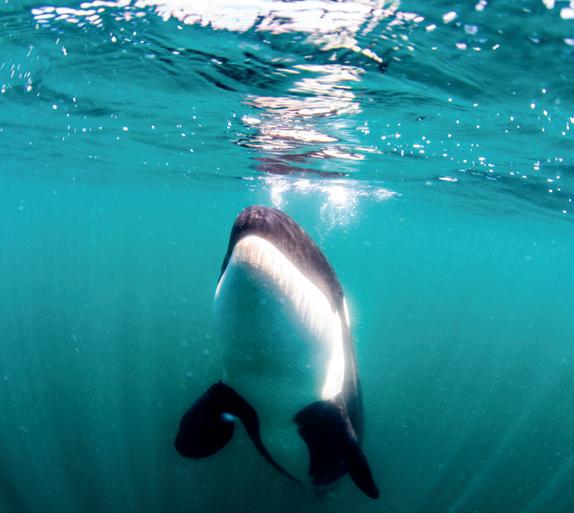
By Dilip Kuner
plan to turn Calvia into one of the greenest coastal destinations in the Med.
Officials say it’s not just about sav-

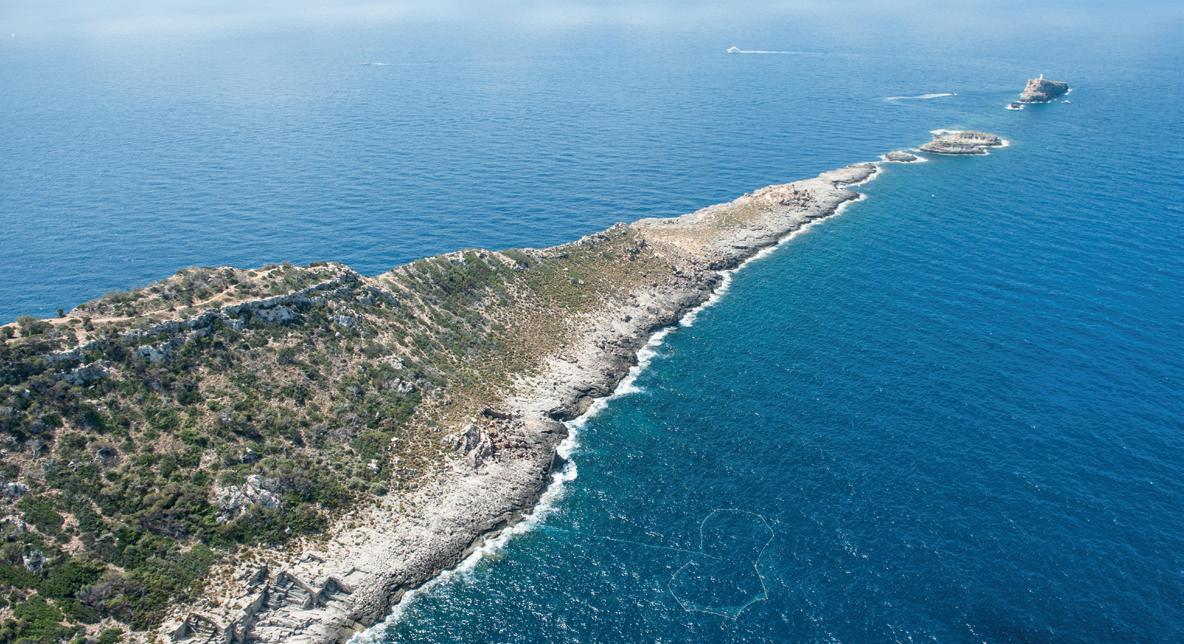
PROTECTED: The Illes del Ponent Marine Reserve

ing fish – it’s about sustainable tourism, protecting endangered wildlife (including rare birds and lizards), and supporting local fishers who use
traditional methods. It also aligns with other eco-initiatives in the area – like forest restoration at the Galatzo estate and recy-


Voted top expat paper in
A campaigning, community newspaper, the Olive Press represents the huge expatriate community in Spain with an estimated readership, including the websites, of more than two million people a month.
THE disappearance of three-year-old Oliver Pugh from Marbella has exposed not only the heartbreak of a custody battle gone wrong but also the dangerous influence of social media in shaping real lives. His mother, Russian ‘relationship influencer’ Anastasiia Chikina, is suspected of spiriting him away just as a Spanish court was preparing to hand full custody to his British father, Matthew. With over 140,000 followers, Chikina is no stranger to public performance. But when personal drama becomes content, the child at the centre risks becoming little more than a prop in a self-curated narrative. Her cryptic online posts, hinting at shadowy conspiracies ‘against the child’, play into an audience hungry for spectacle.
Yet behind the hashtags lies a sobering reality: a boy torn from stability, friends, and family.
The father’s desperate €100,000 appeal underlines the sheer human cost of what is no longer a private tragedy, but an international incident spanning Spain, Russia and Thailand.
The case highlights how the internet age blurs lines between activism, self-expression and reckless self-promotion.
When every decision is shared with thousands of strangers, it becomes all too easy to mistake applause for legitimacy.
Custody rulings should be contested in courtrooms, not on Instagram.
International authorities must move swiftly – and cooperatively – to protect Oliver, because parental abduction is not a victimless act.
For every ‘like’ Chikina receives, a small child remains missing.
In the battle between influence and responsibility, only one truth should matter: Oliver deserves safety, stability, and both parents in his life.
Until that happens, no amount of online justification can disguise the harm already done.
PUBLISHER / EDITOR
Jon Clarke, jon@theolivepress.es




ADMIN
Dilip Kuner dilip@theolivepress.es Walter Finch walter@theolivepress.es
Yzabelle Bostyn yzabelle@theolivepress.es
Samantha Mythen samantha@theolivepress.es
Tom Ewart Smith tom@theolivepress.es
Victoria Humenyuk Makarova (+34) 951 154 841 admin@theolivepress.es

Alex Trelinski alex@theolivepress.es
Joshua Parfitt josh@theolivepress.es
Dylan Wagemans dylan@theolivepress.es
OFFICE MANAGER
Estefania Marquez (+34) 658 750 424 accounts@ theolivepress.es
For all sales and advertising enquiries please contact +34 951 15 48 41
Deposito Legal MA: 498-2019


WHEN a torrent of water ripped through Valencia last September, drowning streets, sweeping away cars and killing 224 people, another flood surged in parallel.
Social media, it turns out, was awash not just with images of swollen rivers and heroic rescues, but with lies, hoaxes and deliberate disinformation.
A new joint study by the universities of Valencia and Castellon has revealed the shocking scale of fake news that spread during those fateful days of the DANA storm – and why Spain remains dangerously vulnerable to the next fake news digital deluge.
The academic project found that in the days after the skies opened, hashtags about the disaster understandably trended across X (formerly Twitter), TikTok, Facebook and Telegram.
But while emergency workers raced to pull survivors and bodies from flooded streets and neighbours scrambled to save homes, another kind of frenzy was unfolding online. False videos circulated claiming dams had burst, while WhatsApp chains falsely reported that the drinking water was contaminated.
Most alarmingly of all, posts were put out that featured footage from floods in Asia and South America, passing them off as scenes from Valencia.
“Moments of high uncertainty are the perfect breeding ground for disinformation,” explained lead researcher Carles Pont.
“In these situations, citizens are desperate for information, but the speed of social media means rumours spread faster
How fake news flooded Spain alongside the deadly DANA floods that killed over 200 people in Valencia
By Dilip Kuner
than facts.”

The study analysed more than 200 widely shared posts across the four platforms, filtering out the most viral examples of fake content.
It found that disinformation fell into three main categories:
● Exaggerated claims of damage or risk – such as collapsing bridges or entire towns supposedly under water
● Health and safety scares – like contaminated tap water or poisonous animals invading urban areas
● Political blame games – with manipulated photos and memes accusing regional or national leaders of negligence
What was most striking, the researchers noted, was how easily these falsehoods gained traction. Many were boosted not just by anonymous accounts but also by well known influencers with large followings.




DISTRIBUTION ENQUIRIES (+34) 951 154 841 distribution@ theolivepress.es




THEY wear designer clothes, speak with theatrical accents, and wouldn’t dream of holidaying anywhere that isn’t painfully exclusive – but Spanish pijos aren’t quite what you think. While they might look like aristocrats at first glance, these flashy figures of Iberian high society are a world apart from Britain’s discreetly posh elite, or France’s haute bourgeoisie. In fact, the pijo is in a category all of their own – and it’s one that’s as en tertaining as it is revealing. In Spain, the word pijo doesn’t just describe how someone dresses – it’s a whole identity. Gustavo Egus quiza, expert in luxury tourism and a man who knows a Gucci loafer from a mile away, says it straight: pijos aren’t necessarily rich, but they want the world to think they are. “They want to be seen, rec ognised, imitated,” he says. Whether it’s the way

Their hugely popular sites often shared the videos without checking – and sometimes, it seems, spread the lies deliberately.
But why do these lies spread so fast?
According to the study, part of the answer lies in human psychology: In moments of crisis, people are wired to latch onto dramatic information, especially if it promises to explain the chaos around them.
But the other culprit is the technology itself.
Social media algorithms reward engage-
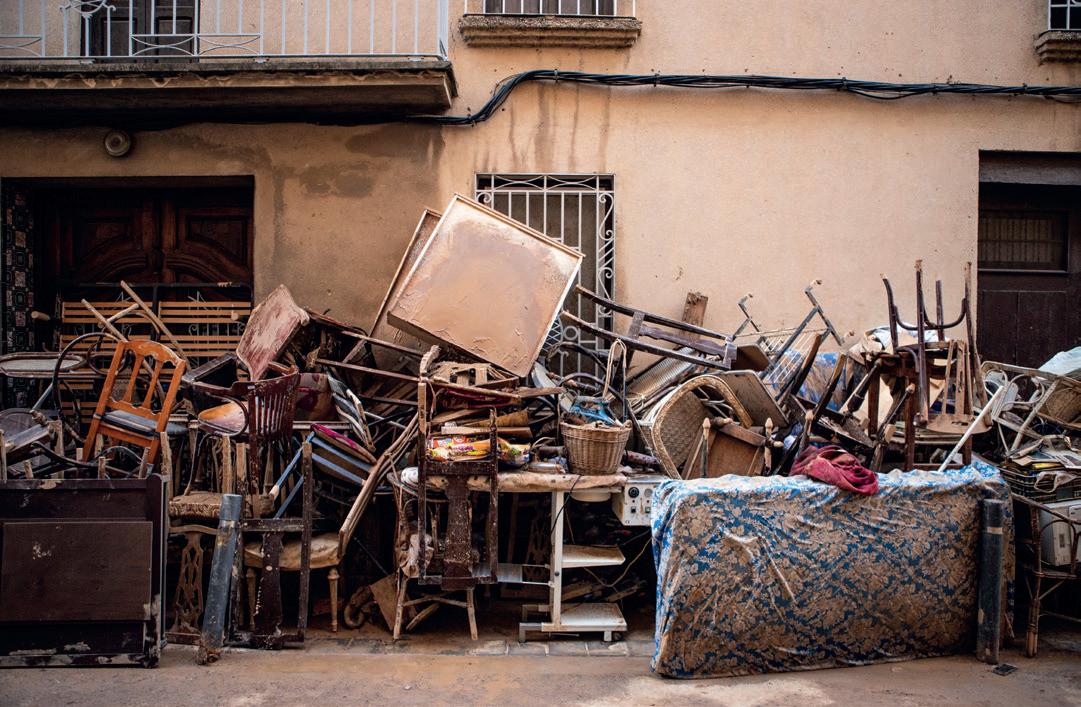
Now the bulk of holidaymakers have finally departed the costas, luxury tourism expert lays out the differences between posh Brits and Spanish ‘pijos’
By Dilip Kuner


they talk – full of exaggerated vowels and rolled R’s – or how they flock to the trendiest summer spots, pijos live for the image. And that image is instantly recognisable: pastel polos with the collar up, boat shoes worn without socks, designer sunglass es permanently in place, and branded leather goods they can’t quite afford.
It’s less about actual wealth, and more about convincing you they’ve got it. Compare that to the British posh – a very different beast altogether. Over in England, the tru ly posh don’t need to shout about their lineage. They’ve been through Eton or Harrow, spent a few years yawning their
way through Oxford or Cambridge, and they probably own at least one crumbling estate in the countryside. Their accents are crisp, their manners impeccable, and they wouldn’t be caught dead in anything too loud.

Think battered Barbour jackets, old cashmere jumpers with holes at the elbows, tweed skirts, pearls inherited from grandmother – an effortless uniform that whispers
“Victoria Beckham? Absolutely not,” says Egusquiza. “Too visible, too new money.” Although pijos could be viewed as distant cousins to the 1980s yuppies of the UK, overall, in posh Britain, if you’re trying too hard, you’re already out. What really separates these groups, Egusquiza says, is how they spend. The British go for excellence – fine hotels, impeccable




For many expat families, one of the biggest questions after moving to southern Spain is where their children will go to school. With more than 300 international schools across the country - dozens on the Costa del Sol, alone - the choice can feel daunting.
Parents must weigh up British qualifications, the Spanish system, or, in some cases, the International Baccalaureate. Fees vary widely, curricula differ, and every
By Adam Husicka


es. The British route, with GCSEs and A-levels, is internationally recognised and remains the gold standard for students planning to attend universities in the UK or beyond.
The IB, by contrast, is broader and more universal, requiring students to study subjects across sciences, arts, and maths – perfect for ‘all-rounders’, though demanding for those who prefer to specialise.
The Spanish curriculum, meanwhile, may suit families who see their children staying in Spain long term, as it prepares them directly for Spanish universities through ESO and Bachillerato. Many international schools along the Costa del Sol reflect this diversity, often combining different routes under one roof.
For instance, Laude San Pedro International offers both British and Spanish pathways, allowing students to
switch tracks from Year 8 if they wish to pursue ESO and Bachillerato, or move, as some do, from the Spanish system to A-levels.
Annual fees here range from €11,178 in the early years to €24,690 in sixth form for the British track, while the Spanish system is slightly lower at €9,858 in ESO to €12,710 in Bachillerato.
Joe Short, Head of Secondary at Laude, says this flexibility is one of the school’s biggest strengths.
“We follow the British curriculum from early years through to sixth form, preparing students for GCSEs and A-levels, the gold standard for university entry.
“But from Year 8 onwards, pupils can also switch to our Spanish pathway, with ESO and Bachillerato, allowing them to access Spanish universities. There’s support in place for them in all of the pathways.”
He also highlights the school’s ‘Future Pathways’ programme, which helps teenagers with UCAS applications, personal statements, and university options abroad.
Other schools lean more firmly towards one model.
Benalmadena International College, for example, follows the British system exclusively, taking pupils from nursery through to sixth form.

It also offers BTECs, giving older students a more practical option alongside traditional A-levels. Aloha College Marbella, by contrast, blends the British route with the International Baccalaureate in its upper school – providing students with the choice between depth and breadth in their final years.

There are four phases:
• Educacion Infantil (Preschool) - 3 to 5 years of age (inclusive, i.e. three years). This is optional.
• Educacion Primaria (Primary Education) - 6 to 11 years of age (six years). Compulsory.
• Educacion Secundaria Obligitoria or ESO (Compulsory Secondary Education) - 12 to 15 years of age (four years).
• Bachillerato (Post-Compulsory Schooling) - 16 and 17 years of age (two years).
The Pre-school stage (infantil or popularly known as pre-escolar ) is free for all children but not compulsory. However, it is regarded as an integral part of the education system with infants’ classes at almost every primary school. There are some separate nursery schools, colegios infantile s, also.
The next two phases, primary ( colegio ) and secondary school ( instituto ) education are compulsory and free of charge. At the end of the ESO successful pupils are awarded a Secondary Education Certificate, which is necessary to enter the post-compulsory stage of schooling for their university or vocational studies. Alternatively they may leave school and get a job. Once pupils have their Bachillerato they can take their university entrance exam.
ents to request full details directly.
As Short puts it: “A-levels are about depth of knowledge; the IB is about breadth. A-levels are better for many of the students that we have come through, because they can be specific.
According to the Good Schools Guide, past fees have ranged from €7,075 to €17,180 per year depending on the year group, though the school now asks par-
PROS
Your child will be involved in your local community Their friends will live locally They will quickly be fluent at Spanish / bilingual There’s no need to transport your children to school It is free of charge
“On the other hand if you’ve got an all-rounder, someone who’s good at everything, IB gives you more kudos; it’s a full package.”
For families, this variety can be both a blessing and a challenge.
One long-term expat mother,
CONS Rigid structure based on continuous assessment Difficult for parents who don’t speak Spanish to understand what’s going on Not much creative learning, in terms of art, drama, etc.
2 It is relatively easy for your child to repeat a year. Re secondary education, the repetition rate is 5.5% for state institutions combined to 1.4% for independent.
based in Estepona, who has guided three children through a mix of Spanish and international schools, says the right choice often depends on timing.
“To begin with, we chose the Spanish system because our kids were born here. We wanted them to integrate and not live in a bubble,” explained the Belgian businesswoman.
“As they got closer to university, we left the choice to them, but ultimately they all went the private route.
PROS
3 Cambridge exams are provided
3 Caters for entry to UK universities
3 International Baccalaureate entry
3 Individualised learning plan
3 Constant contact with parents / partici- pation in the learning experience
3 Speak to educators in English
CONS
2 The cost each year
2 Paying for school uniform, that your child must wear
2 Less immersion of your child in their local community
2 Friends might live further away
2 Child is less likely to be fluent at Span- ish
2 The need to transport children to school – possibly at a geographic dis- tance
2 The school holidays do not match Spanish holidays
“My eldest son (now at university in Scotland) preferred A-levels because he was very focused on certain subjects.
“With the Spanish system, you sort of have to choose between a scientific bachillerato, an artistic bachillerato, or humanities, and you can’t really mix them. That’s why the IB appealed to my second son, where he could choose whatever subjects he wanted to do, aside from the core subjects.”
While she values the private options, she remains an advocate of the state system too:
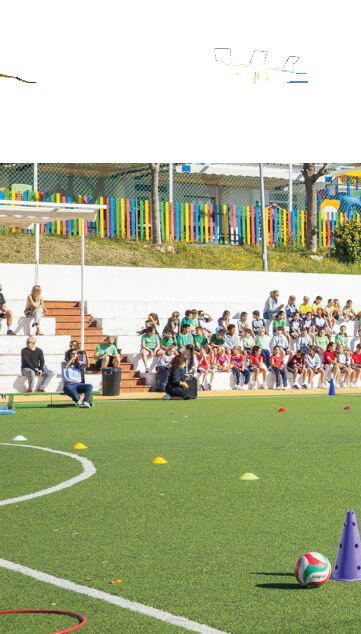
“I would really encourage kids to go into a Spanish school, public or private at first. Even if you want your children to end up studying in English, you could do primary in Spanish and then switch to an international secondary.

“Having a good base in Spanish is a huge advantage if you’re raising your kids here,” she stresses. Ultimately, the decision comes down to priorities. Do you want the broad, global focus of the IB? The rigorous specialisation of A-levels? Or the rootedness of the Spanish system?
Schools like Laude, Benalmadena, and Aloha show the spectrum of what’s available – but they are just examples of a much wider picture. What matters most is not the label on the curriculum, but whether children feel supported, challenged, and equipped for the future.
On the Costa del Sol, expat families have more options than ever to make sure they do.
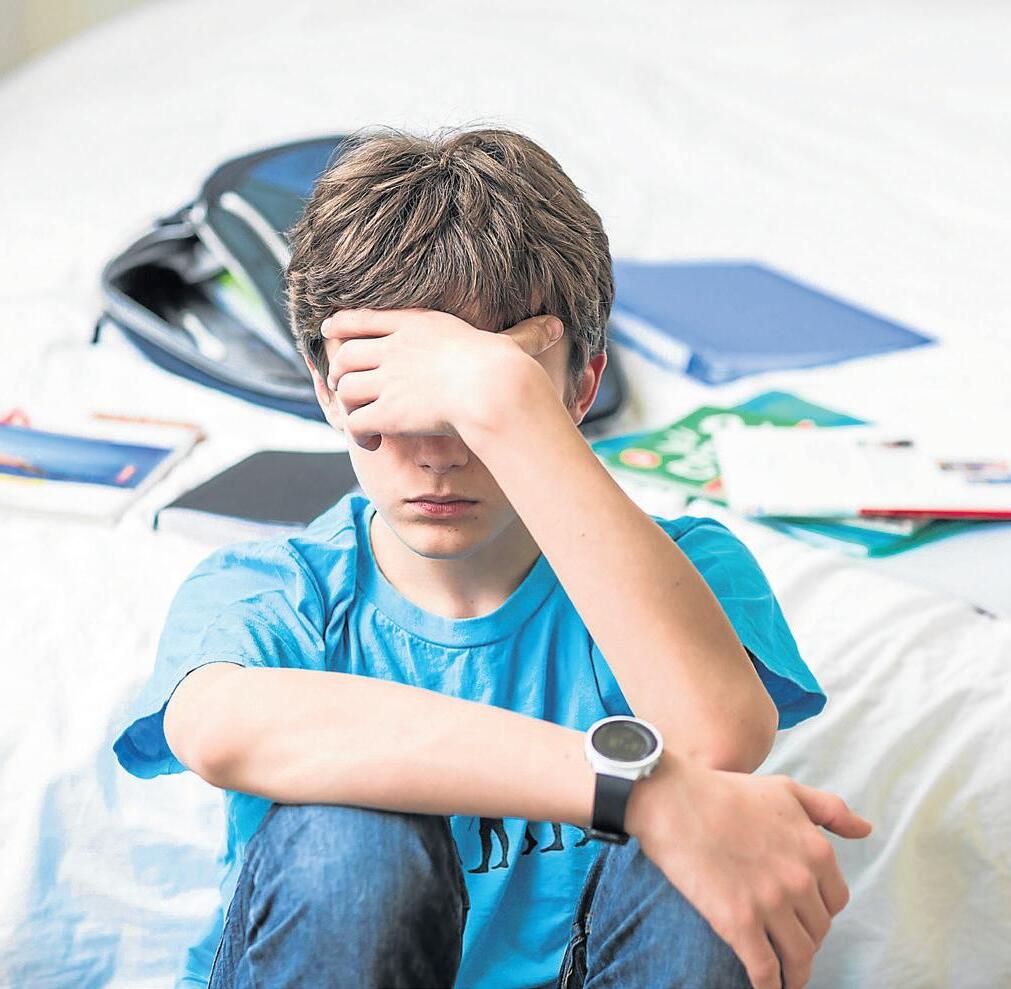
THE greatest threat to 21st century schoolkids is still cyberbullying – and in 2025, the problem is bigger, faster and harder to control than ever before. This insidious form of antisocial networking can happen relentlessly, anytime and anywhere. What was once a whispered insult or playground punch now follows children home, invading their bedrooms via mobile phones and social media.
Spain’s National Police say smartphones were the ultimate game-changer. Today, most bullying cases involve an online element, often escalating from schoolyard taunts into 24/7 harassment.
“The talks we once gave to 15-year-olds, we now give to eight- and nine-year-olds,” a spokesman warned. “Parents hand over smartphones without thinking – it’s like giving a child the keys to a car without teaching them the rules of the road.”
Mobile phones for minors is ‘like giving kids a car without explaining the rules of the road’
The numbers are stark. A 2024 report from Spain’s Ministry of Education revealed that half of children now own a mobile phone by the age of 10. By 12, that figure shoots up to nearly 80%, and by 14 it is virtually universal. Not having a phone, ironically, can itself become a reason for exclusion. Spain has tried to fight back. In 2020, Madrid banned mobile phones inside classrooms, following regions like Galicia and Castile-La Mancha. More than 1,700 schools and some 800,000 pupils were affected. Since then, other regions have followed suit, and in late 2023 the national government announced plans to extend the ban
to all public primary and secondary schools. The Education Ministry said the measure was aimed not only at raising academic performance but also at cutting off the channels through which bullying spreads. But critics argue that the real battlefield is outside the classroom walls – on WhatsApp groups, TikTok, Instagram and, increasingly, anonymous platforms where abuse is harder to track. The COVID pandemic only accelerated the crisis. Children stuck at home became more reliant than ever on social media, apps and video calls. A 2024 study by EU Kids Online found that cyberbullying cases in Spain had risen by nearly 65% since 2019, with girls disproportionately affected. And while platforms claim to be cracking down, new apps and encrypted messaging services make it harder than ever to monitor.
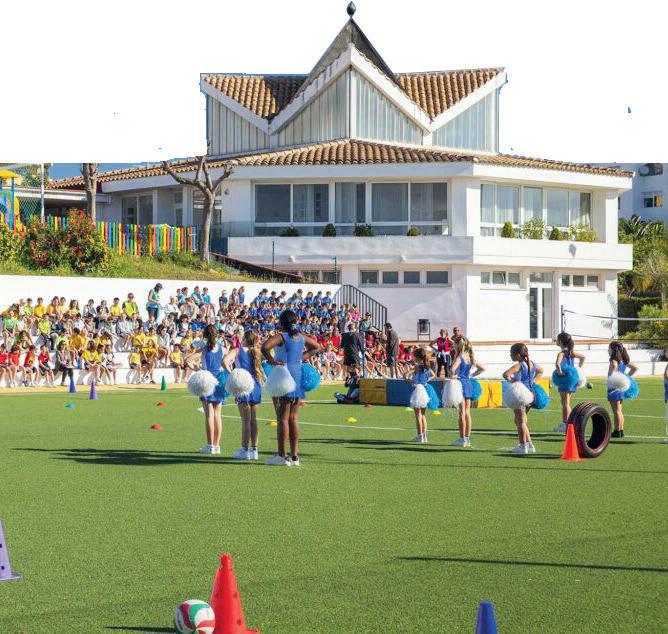
FACILITIES: International schools often have top-rate infrastructure



AS ‘Back to school’ season is right around the corner, parents all over the country will be fretting about the upcoming school year while their children are glued to their tablets.
To help soothe this arduous season, the Olive Press has created a list of important tasks to tackle to ensure a smooth sailing start to the year.
One very important thing to remember when preparing your child for going back to school is clothing. Even if your school does not require a uniform, children grow very quickly in very short periods of time. New clothes that are adequate for all weather types and that fit your child perfectly are necessary for back-to-school prep.
The list of equipment your child needs will grow exponentially as they get older. Helpfully, schools sometimes send out lists of what you will need, from pencils to protractors. It may also be helpful to
S Spain’s new academic year gets underway this September, one issue remains stubbornly unresolved – the gender gap in science and technology.
Despite girls performing just as strongly as boys in maths and science at school, only three in ten young women in Spain choose to pursue STEM careers.
The result is a shortage of female role models in labs, lecture halls and tech companies – a problem that experts warn is holding back innovation at a time when the world desperately needs more scientific

By Yzabelle Bostyn

talent to tackle climate change, energy security and health crises.
Globally, the picture is much the same. Just 33.3% of scientific researchers worldwide are women, while only 35% of STEM students are female. Yet studies continue to show that girls and boys achieve similar results in science and mathematics during their school years. The challenge is turning that talent into lasting careers.
“Women need science, and science needs women,” UNES-
ask your child if there is anything they personally would add; not every child is the same, and some may work better with extra or different items.
Lunch is a big part of the school day, and sometimes it is a child's favourite hour. Whether pack-up or school dinner, making sure they have either money or food is essential. For school dinners, it's pretty simple—setting aside some money every day for them. Packed lunches are a little more complicated, but they are great for picky eaters or for you to keep tabs on what your child is eating. Some schools have some strict rules about the contents of the lunchbox, so check in to see if anything is prohibited.
Whether your child is starting at a new school and you haven’t decided on the best way to get them there or you need to get them a bus pass, having travel to school sorted is imperative. It’s the first obstacle for your young ones on their first day back and having an
Half a dozen things to think about before starting school, with
easy experience with the bus or already being familiar with their walk will make them feel well prepared for their first day back.
Children may not like having tags in their clothes as it is not ‘cool’ but having your child's name in their uniform can be a game-changer. No more rummaging around in a pile of jumpers left in a pile at school. In addition to adding their names to their clothes, getting them to wear in their shoes is a life saver. The first day of school may be daunting for them anyway, why add uncomfy shoes to the mix? Letting them wear their shoes means no blisters on the first day and one less thing for them to worry about.
As soon as your child has got one, print out a timetable so you can keep up to date with what they need everyday. Gone are the days of being told they have no ingredients for their food tech lesson or PE kit for their PE lesson. Not only does this help for classes but also for any after school clubs.

CO has warned. “Only by tapping into all sources of knowledge and talent can we unlock the full potential of science and meet the challenges of our time.”

In Spain, the imbalance is particularly stark. While women dominate in care-related professions such as nursing – making up around 82% of the workforce – they remain under-represented in fields like engineering, physics, computer science and technology. Only one in four Spanish university professors are women, and just a quarter of scientists cited in the Spanish press are female. There are signs of progress.
A study by the Universidad Rey Juan Carlos found that the proportion of female scientists in Spain rose from 9% to 34% between 2015 and 2020, a trend that campaigners hope to accelerate.
One of the most visible initiatives is #NoMoreM-
atildas, a campaign tackling the socalled ‘Matilda Effect’ – the tendency for women’s scientific achievements to be overlooked or attributed to male colleagues.
The group has developed storybooks reimagining famous discoveries with women at the forefront, alongside an annex to Spanish textbooks that restores female scientists left out of the historical record. Their message is clear: inspiring today’s girls requires showcasing yesterday’s forgotten pioneers. Spain is not alone in its struggle. In the UK, for example, women make up just 31% of STEM higher education students, and only a quarter of those graduates go on to work in related fields. Across Europe, the gender gap is seen as a brake on progress. Clearly, the problem is international –and the solutions will need to be too. As the #NoMoreMatildas campaign puts it: “It makes no sense to use just half of the minds we have at our disposal to fight the challenges we face.

MORE than 136,000 stu -
dents entered Spanish for their GCSE exams this year, according to new figures from the UK’s Joint Council of Qualifications. That puts it just ahead of French, which recorded a little under 133,000 entries. It is the first time Spanish has officially moved past French, which for decades had been the leading modern language in British schools. German has continued its decline, falling to just over 33,000 entries.
Teachers and language experts say Spanish’s global reach, spoken widely across Spain, Latin America and the Caribbean, has given it an advantage.
Many pupils also feel it is easier to pick up. One London student explained that Spanish pronunciation made more sense to him than French, and that he saw it as more useful for travel.
The British Council highlighted how cultural influences have boosted the appeal of the language in recent years.
Holidays in Spain and the Canary Islands remain a big draw, while music, films, and US media featuring Spanish have added to the influence too.
FAMILIES face record bills for kitting out their youngsters, with the average cost of going back to school now hitting €486 per student, according to consumer group OCU. That figure doesn’t include extras like uniforms, excursions or lunches – and the single biggest burden is still textbooks.
Spanish parents pay on average €327 for books alone, up nearly 6% on 2023 and more than 20% higher than pre-pandemic levels. Unlike in the UK and much of northern Europe, families in Spain are expected
to foot most of the bill for their children’s books.
“Spain continues to have some of the highest textbook prices in the EU, and it’s a direct hit to household budgets,” warned Idealo’s Kike Aganzo.
The squeeze isn’t felt equally everywhere. Several regions, such as Castilla-La Mancha and Extremadura, subsidise or lend out books, while others like Valencia, Navarra and Catalunya remain among the most expensive for parents. And books are only the start. The

National Catholic Confederation of Families and Parents of Students (CONCAPA) says this September will be ‘the most expensive school year in history’.
President Rafael Araujo explained:
“It’s not just the cost of textbooks – families are also paying more for buses, canteen meals, uniforms, extracurricular activities, excursions, insurance and AMPA (par-
ent-teacher association) fees. Everything is going up.”
Consumer groups are urging parents to shop around online, buy second-hand where possible, or use book exchanges organised by parent associations.
FALLING birth rates are having a ‘profound impact’ on public education, with over 340,000 fewer children in kindergartens and primary schools today compared to 2018.
In just the past five years, enrolment in schools for ages three to six has dropped by 160,000 pupils, while there are nearly 180,000 fewer children in the six-to-12 age group. The downward spiral shows no sign of slowing: Spain registered just 322,075 births in 2024, the lowest figure since records began. The decline is already reshaping the school map. According to Education Ministry fig-


birth rates mean state school closures while independent sector booms
By Alex Trelinski
ures, 126 public schools have closed in the past decade –many in rural communities hit hard by depopulation. By contrast, around 100 new private schools have opened, mostly in urban areas catering to more affluent families, and offering full service from nursery through to secondary. Spain currently has 13,360 public primary schools –
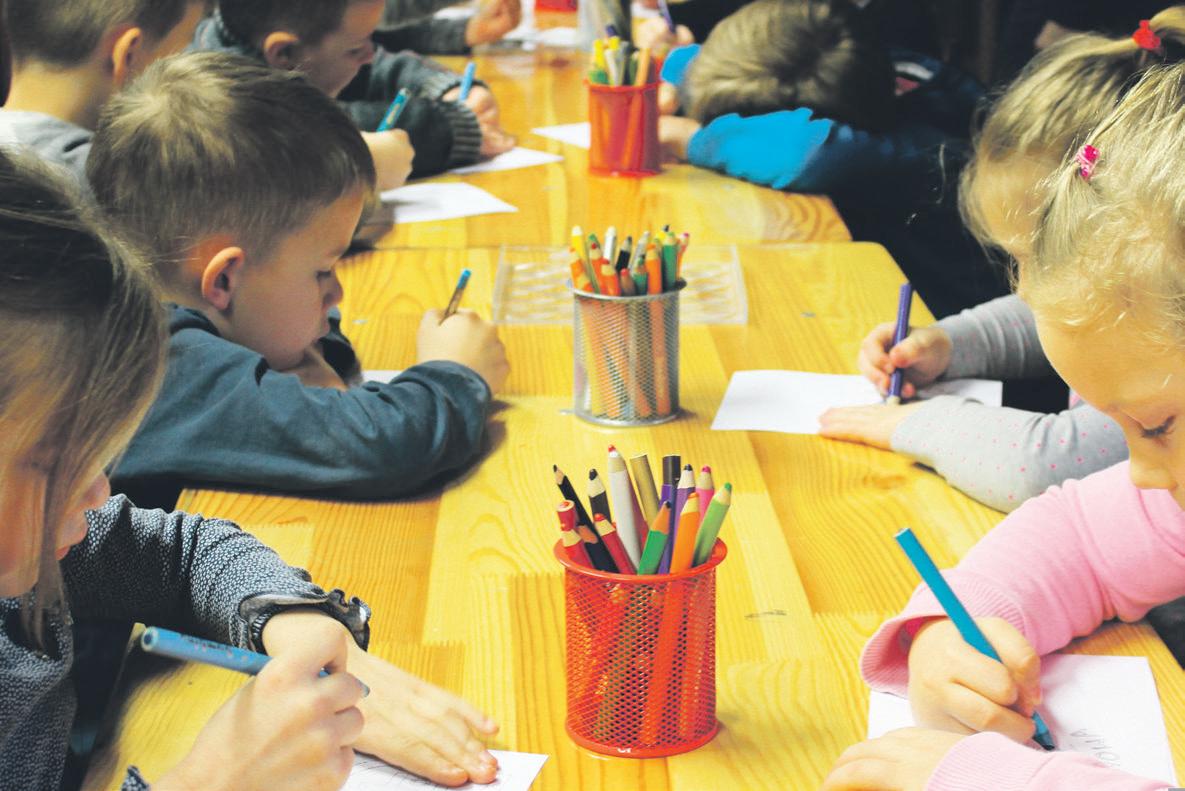
6 Native of Munich, for example (8)
8 Clothed (4)
9 Such as “Disgusted of Tunbridge Wells” (6-6)
10 Darts out - it’s a fiddle (5)
11 Raining hard (7)
14 Most favourable (7)
16 Honour --- thieves (5)
19 Such as lathes and drill presses (7,5) 21 Isle of Wight bay (4) 22 Kind of glacier (3,5)
1 Seasoned smoked beef (8)
2 Docking spots (5)
3 Weather-beaten Gran led revolution (7)
4 “Get lost!” (4)
5 Rabbit residence (6)
7 Spook (5)
12 Pleistocene beasts (8)
13 Neighbour of Algeria and Libya (7)
15 Spot (6)
17 Nick ---, “Lorenzo’s Oil” actor (5)
18 Assailed on all sides (5)
20 Draw near (4)
around 30 fewer than a decade ago – but the national figure hides sharp regional differences. Madrid, the Basque Country, Aragon and the Balearic Islands are the only regions where the number of public schools has actually risen. Aragon’s former education minister Felipe Faci previously admitted the political sensitivity of the closures. “We had a policy where just three pupils were enough to keep a rural school open. When one closes, it impacts not only families but also canteens, transport and community life,” he said. “The last thing parents want is
for their children to travel 30 kilometres a day.”
But many experts argue that keeping tiny schools afloat is unsustainable. Lucas Gortazar, head of education at Madrid’s Esade Centre for Economic Policy, described the falling birth rate as ‘the greatest educational challenge of our time’.
SPANISH and British students can continue crossing borders for higher education under a landmark deal signed between the two countries in 2023.
The agreement ensures that school-leaving qualifications – Spain’s Bachillerato and the UK’s A-levels – are mutually recognised for entry into universities. It means that Spanish students can still apply to British universities using their Bachillerato results, while UK students with A-levels can access Spanish universities without having to sit the country’s general entrance exam (EBAU).
Instead, A-level results are directly converted into Spain’s entry points system, worth up to 10 points out of the maximum 14. However, for competitive courses such as medicine, law or engineering, UK applicants may still need to take the specific (optional) part of the Spanish exam in order to reach the highest scores.
He said: “The decline means more money per student –but the debate is how to spend it. Do we reduce class sizes, invest in technology, expand extracurriculars, or increase scholarships? The wrong choice could waste an historic opportunity.”
In larger towns and cities, the picture is different. Falling rolls have seen schools merged and staff redistributed, with many teachers facing larger, more mixed-age classes. Meanwhile, private schools are expanding, positioning themselves as stable, long-term options for middle-class families.
With Spain’s birth rate now among the lowest in Europe –just 1.2 children per woman in 2024 – demographers warn the trend will only accelerate. For the country’s schools, the next decade could mean fewer pupils, fewer teachers – and a radically different education system.
THE Spanish government has targeted the three Rs as it tries to improve academic results.
IT recently announced an initiative aimed at improving students’ math, reading and writing skills.
According to Education Minister Pilar Alegría the programme will focus on providing students with the tools and resources they need to excel in these essential subjects.
“We're seeing too many kids struggling with basic maths and

1 1 1 1 2 3
reading,” the minister said. “This is unacceptable. It's time for a change.” Resources will be devoted to teacher training and the programme will target younger students to ensure they have a strong foundation in these subjects from an early age. The minister also indicated that children who need extra support will have access to after-school tutoring and mentoring programmess, and parents will be encouraged to take a more active role in their children's education.
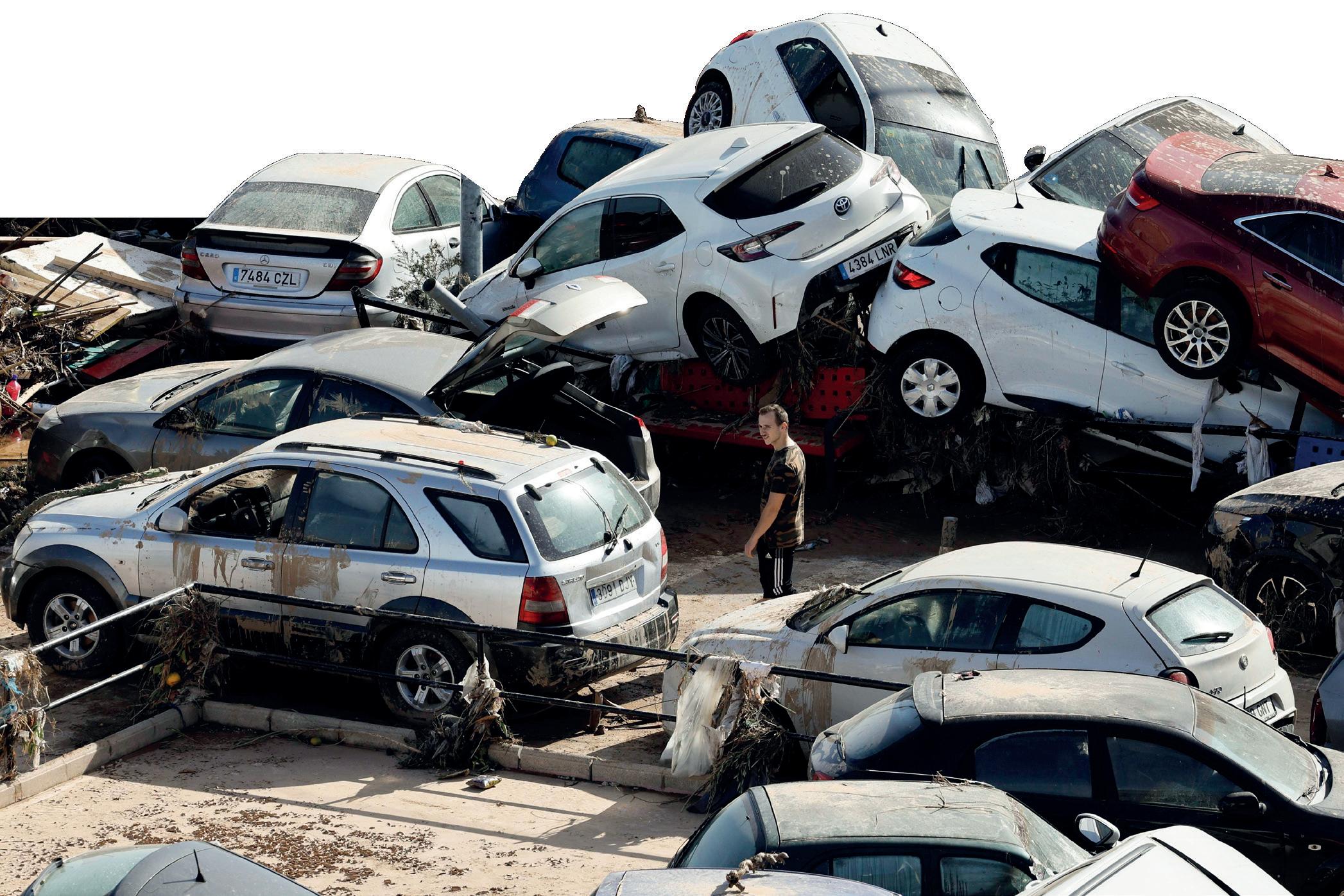
ment – and shocking, scary or angry content always triggers the most clicks, shares and comments.
“In a way, the platforms themselves act like accelerants,” said Pont. “They don’t distinguish between true and false. They only measure which posts keep people scrolling.”
For residents already reeling from the storm, the fake news made things worse.
Some neighbours stopped drinking tap water unnecessarily. Others avoided certain roads after reading rumours they had collapsed.
In several cases, emergency hotlines were jammed with callers trying to verify wild stories they had seen online.
“All this disinformation puts extra pressure on the emergency services, which are already stretched to the limit in these situations,” added co-author Ana Segovia.
There were some brave attempts at a pushback: Spain’s small but determined network of fact-checking organisations – including Maldita.es and Newtral –swung into action during the crisis.
Their teams quickly published corrections, debunked hoaxes and tried to push reliable information through the noise.
including from some well known aggregate ‘news’ sites in English. But their reach was more limited this time. While their careful fact-checks cir-

culated within certain audiences, they never achieved the viral momentum of the false posts they were battling.
“It’s like bringing a bucket of water to fight a wildfire,” admitted one fact-checker interviewed for the report.
The academics behind the study warn that the Valencia case should serve as a wake-up call for Spanish authorities and social media firms alike.
Maldita did the same during the COVID crisis, by calling out dozens of fake news reports,
service, perhaps a quiet jaunt on the Orient Express.
But Spanish pijos? They’re after visibility. They want to be at the right beach club, the trendiest terrace, the most photographed festival.
It’s not always about quality – it’s about being seen in the right place, even if you’re sipping cava on a budget.
For Egusquiza, the real luxury is the quiet kind.
He points to boutique hotels like Palacio de la Helguera or Arbazo in San Sebastian, where service and subtlety are the true markers of class. “True luxury doesn’t shout. It whispers,” he says.
But whispering isn’t really the pijo way. They’re about impact – the look, the statement, the selfie.
Even traditional pijo holiday spots like Palma, El Puerto de Santa Maria and Baqueira, for skiing, are starting to suffer from their own popularity.
When a place becomes too fashionable, says Egusquiza, it loses its exclusivity – and the pijo charm starts to fade.
The truly wealthy, he claims, aren’t chasing the crowds. They’ve moved beyond the need to be seen.
In the end, the Spanish pijo is more than just a fashion statement or a stereotype. They’re a cultural phenomenon – louder than the Brits, but completely, unmistakably Spanish. In a society where appearance often matters more than reality, the pijo has perfected the art of seeming wealthy. Whether they actually are? Well, that’s beside the point.

AS parents across Spain scramble to stock up on uniforms, books, and stationery for the new school year, it’s easy to forget one crucial item for growing (and adult) minds: knowledge.
Whether it’s the latest laws on borders, reasons behind natural disasters or the coolest hotpots worth visiting, there is so much new to learn each week.
The Olive Press is offering a special backto-school gift subscription aimed at teenage children, university students, or anyone eager to improve their English while learning about Spain and the world.
Best of all, anyone can give a subscription as a ‘gift’ – parents, relatives, friends, or even employers looking to encourage learning.
Gift subscriptions are available at a discounted rate of just €24, making it easy to provide a full year of news, culture, and educational content.
Climate change is expected to make extreme weather events like DANAs more frequent and severe in Spain.
Each one is now likely to trigger a parallel surge in online disinformation. After all, the social media sites studied all make their money by serving ads to their followers.
To them, tragedy equals money!
The new report argues that citizens need better ‘digital literacy’ training to help people spot hoaxes in real time.
Schools, they suggest, should teach children not just how to use social networks, but how to distrust them.
They also call on social media companies to step up.
“We are not asking for censorship, but for responsibility,” insisted Pont. “Platforms must design systems that reduce the spread of dangerous falsehoods, especially during emergencies.”
The Spanish government has already been working on disaster readiness, from improving flood defences to strengthening the coordination of emergency services. But experts now say digital resilience should be part of that plan.
“When we talk about protecting communities, we must include protecting them from lies,” said Segovia. “Misinformation can kill indirectly – by causing panic, delaying rescues or undermining trust in the authorities.”
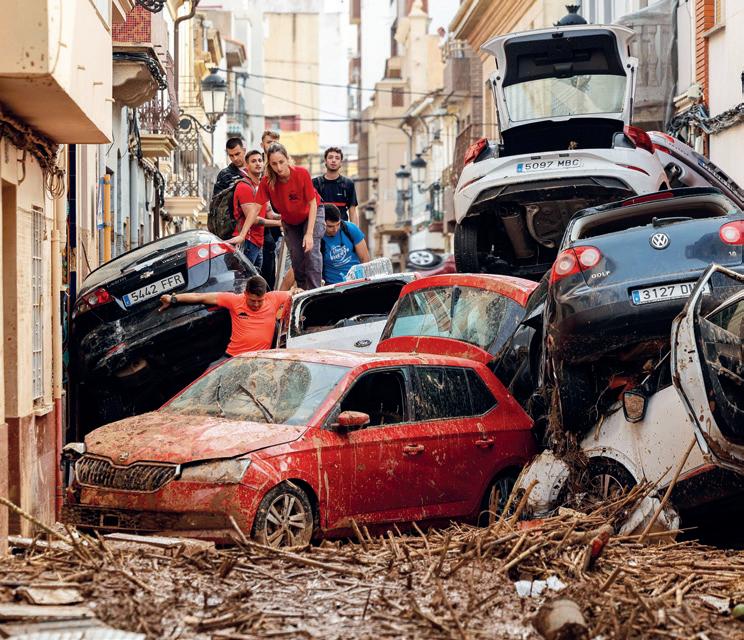
Perhaps the greatest damage, the researchers warn, is long-term.
Each viral hoax erodes the public’s trust in real information sources. If people start doubting everything, they may ignore crucial warnings in future crises.
“This is the paradox,” Pont explained. “Disinformation makes people distrust institutions. But in an emergency, those institutions are the ones best placed to save lives.”
For the people of Valencia, the scars of the 2024 DANA are still raw. Families are rebuilding homes, small businesses are counting losses, and local councils are demanding more investment in defences.
But the digital flood revealed by this new study may be even harder to contain. As Spain braces for more extreme weather, the battle against fake news could prove just as important as the fight against rising waters. Because when the next storm comes, the lies will come too. And unless Spain is ready, the damage they cause could spread just as fast as the flood itself.
From killer crocs to poisoned pipes, the storm showed that fake news can travel just as fast as floodwater – and cause almost as much chaos.
● The bursting dam Doctored videos claimed a major reservoir had collapsed, sending a deadly wall of water crashing into towns. Completely false – but it caused panic in low-lying areas.
● Poisoned tap water WhatsApp chains insisted the mains supply was contaminated. Families stopped drinking it, and supermarkets ran low on bottled water before officials debunked it.
● Crocodiles in the streets
Clips of reptiles wandering flooded towns (actually filmed in Asia years earlier) were passed off as Valencia. Enough people believed it to clog police phone lines.
● Collapsed motorways
Old footage of road sinkholes from South America was recycled as ‘Valencia right now’, convincing drivers to avoid safe routes.
● The underground carpark Claims on social media that it contained the bodies of hundreds of people trapped by the floods were totally unfounded. Firemen found no bodies.
Extra special rates of just €15 are also available for existing subscribers.
Institutions are encouraged to take part too. Schools, universities, town halls, banks, embassies, consulates or other organisations can be provided multiple subscriptions at tailored rates.
This is for small groups of 10 to 15 people to entire schools of over a thousand pupils and staff.
This back-to-school offer is not just about reading the news – it’s about nurturing inquisitive minds and helping young people engage with the world around them.
A subscription to our award-winning platform is a gift that keeps on giving, all year long.
And it is not just for schoolchildren - anyone can gift a subscription to anyone they want.


For anyone interested, please make sure you register on our website and await the special discount code by email over the weekend.
Our new offices are on the second floor of the prestigious Victoria House building on Main Street, we can now offer a complete service all under one roof in Gibraltar. The paperwork side We deal with company formation along with secretary services and business name registration, we have accountants that can deal with the local tax, social insurance, annual returns etc.
We can help with Business licenses, ETB, opening of bank account and submitting of any other licenses that you may need.
The Physical side We can offer Hot Desks, Dedicated Desks, shared Office, 4 standalone offices for 3 to 4 people and a meeting room that could seat 10 people comfortably.
We have a reception that can deal with walk-ins and experienced people that can help in any way needed.All prices are all inclusive apart from phone calls made. We can also point you in the right direction if you are looking for anything in particular not already mentioned.
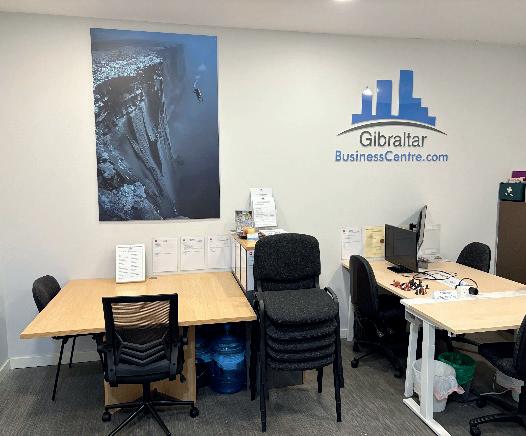
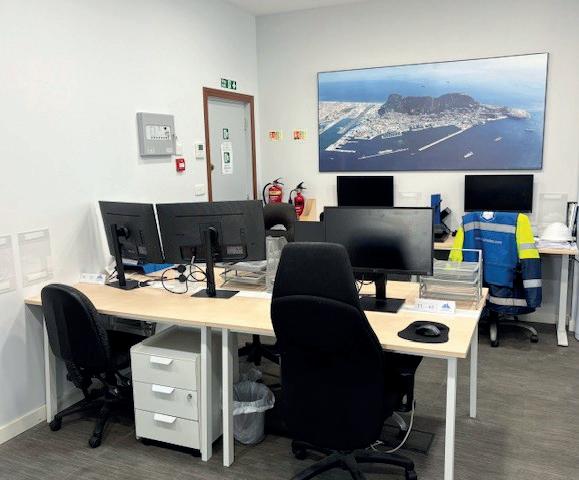
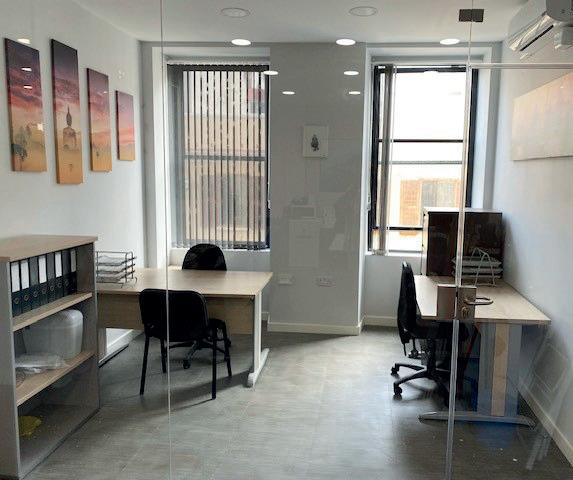

Get in touch to discuss further, contact Chris +350 200 66330 or chris@gibraltarbusinesscentre.com We are here to help!
By Dilip Kuner
IF you want to see Barcelona at its most vibrant, then start planning your trip for the La Merce Festival.
From September 23 to 28, the Catalan capital comes alive

for its biggest festival of the year, celebrating the city’s patron saint, Mare de Deu de la Merce.
Dating back to 1871, La Merce transforms the streets into an open-air stage, with hundreds
ARCHAEOLOGISTS in Ecija (Andalucia) have uncovered a Roman treasure that’s almost two millennia old – a stunning 40-square-metre mosaic that once graced the dining and reception room of a 1,200-square-metre, two-storey palatial home. The find, which con-

of events – many free – drawing tens of thousands of visitors alongside locals.
Start with the gegants and capgrossos, towering papier-mâche figures representing historical and mythical characters, parading through the city’s squares. Then, if you’re
sists of about 60% of its original surface, isn’t just massive – it’s a window into the opulent lives of provincial Roman aristocrats. The floor, or ‘oecus’, features dazzling geometric motifs, vibrant glass tiles, and even seasonal allegories alongside images of birds like partridges and pheasants.
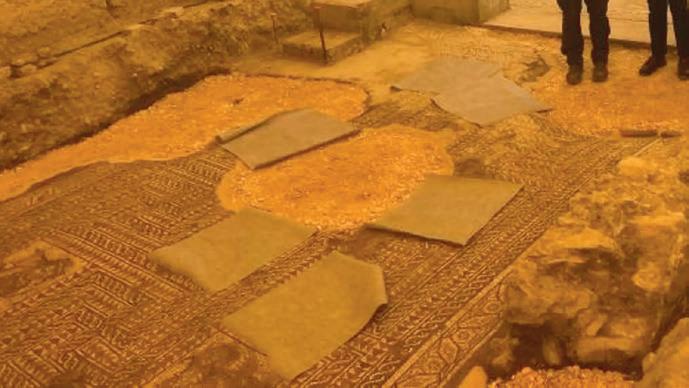
The colours are unusually vivid, with rich blues reserved for the wealthiest of households.
Experts estimate the main residence alone may have had around 400 square metres of mosaic flooring, with some rooms requiring up to two million individual tiles.
feeling brave, join the correfoc – a fiery procession of devils and dragons weaving through the streets with sparks flying. Protective clothing and goggles are essential for anyone planning to get close.
No trip is complete without watching castells, Barcelona’s iconic human towers. Teams of castellers build structures several stories high, culminating with the smallest member – often a child called the enxaneta – climbing to the
top and raising a hand to complete the tower.
Each year, La Merce welcomes a guest city; in 2025, it’s Manchester, UK. Visitors will enjoy performances, cultural exchanges, and artistic collaborations from across the waves. Music lovers can also enjoy the BAM (Barcelona Accio Musical) festival, featuring local and international artists across multiple city venues. Traditional Catalan music, street theatre, dance, and circus acts ensure there is something for everyone.
Museums across the city open their doors free of charge, and the festival also coincides with events like Catalan Book Week, promoting literature and reading. The festival concludes with the spectacular Piromusical on Sunday, September 28 at 10pm on Montjuic. The 20-minute fireworks and light show, now featuring drones, is set to music and can be enjoyed from rooftops, windows, or balconies across the city.


By Dilip Kuner

WHEN Jeremy Clarkson dismissed the Galician city of A Coruña as ‘one of the worst places he’d ever visited’, locals were baffled.
How could he overlook a city where the Romans built lighthouses, where women led battles against invading Englishmen, and where the seafood is so fresh it tastes of the ocean itself?
Far from a dull stopover, A Coruña is one of Spain’s most fascinating cities – a port shaped by the Atlantic, steeped in history, and alive with a food culture that
Jeremy Clarkson called it one of the worst places he’d ever been – but A
Coruña is Spain’s city of light, legends and lobster
could silence even the loudest critic.
The city’s story begins with the Romans, who saw the strategic value of this windswept headland and left behind its greatest monument: the Tower of Hercules.
Built in the 2nd century AD, this granite lighthouse still shines today, making it the oldest functioning lighthouse in the world and a UNESCO World Heritage Site. From the top, visitors are rewarded with sweeping views of the rugged Galician coastline.
A Coruña’s defiance runs deep. In 1589,
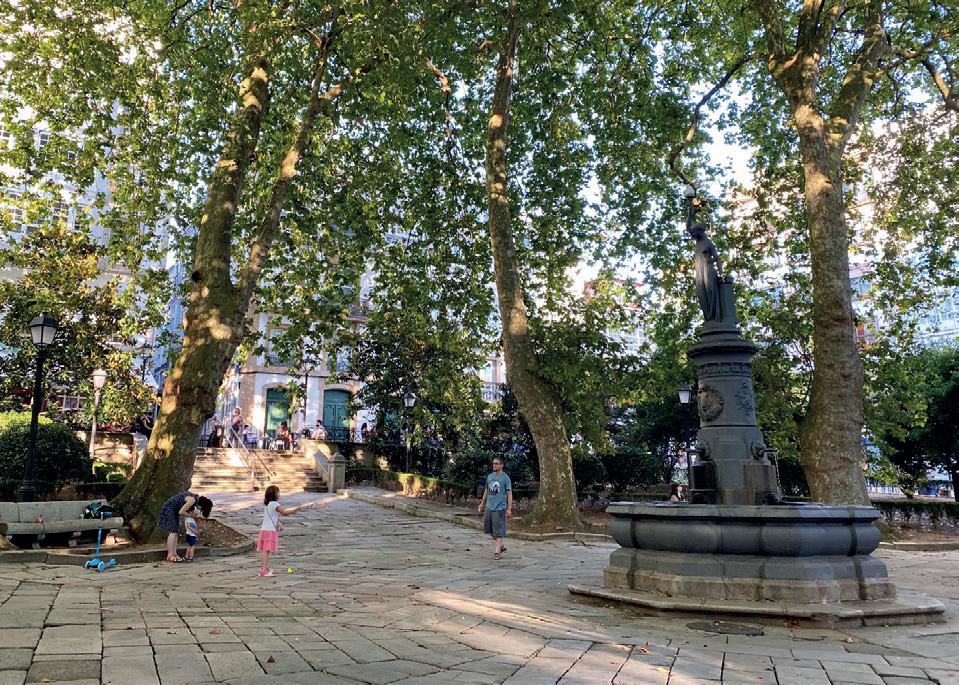
when Sir Francis Drake and an English fleet tried to storm the city, it was not the soldiers but Maria Pita, a local woman, who rallied the townsfolk.

immortalised today in a towering statue in the city’s main square, which also bears her name.
In the 19th century, A Coruña became a hotbed of liberal thought and modernisation. It was here that writers like Emilia Pardo Bazan, one of Spain’s great literary figures, championed women’s rights and shook the conservative establishment. The city’s Casa Museo Emilia Pardo Bazan pays homage to her trailblazing life.
A Coruña has long been called ‘the city of glass’ thanks to its distinctive galerias – white, glass-fronted balconies that line the seafront. Once designed so fishermen’s wives could watch the harbour without braving the Atlantic winds, today they gleam in the sun and give the marina its unique face.
The Marina and Port of A Coruña remain the city’s beating heart, a place where luxury yachts moor alongside working fishing boats.
Legend has it she killed an English officer herself before shouting: “Whoever has honour, follow me!” The English were driven back, and Maria Pita is and the great headland crowned by the Tower of Hercules.
Stretching out from here is the Paseo Marítimo, one of Europe’s longest seafront promenades at nearly 13 kilometres, passing beaches, parks,
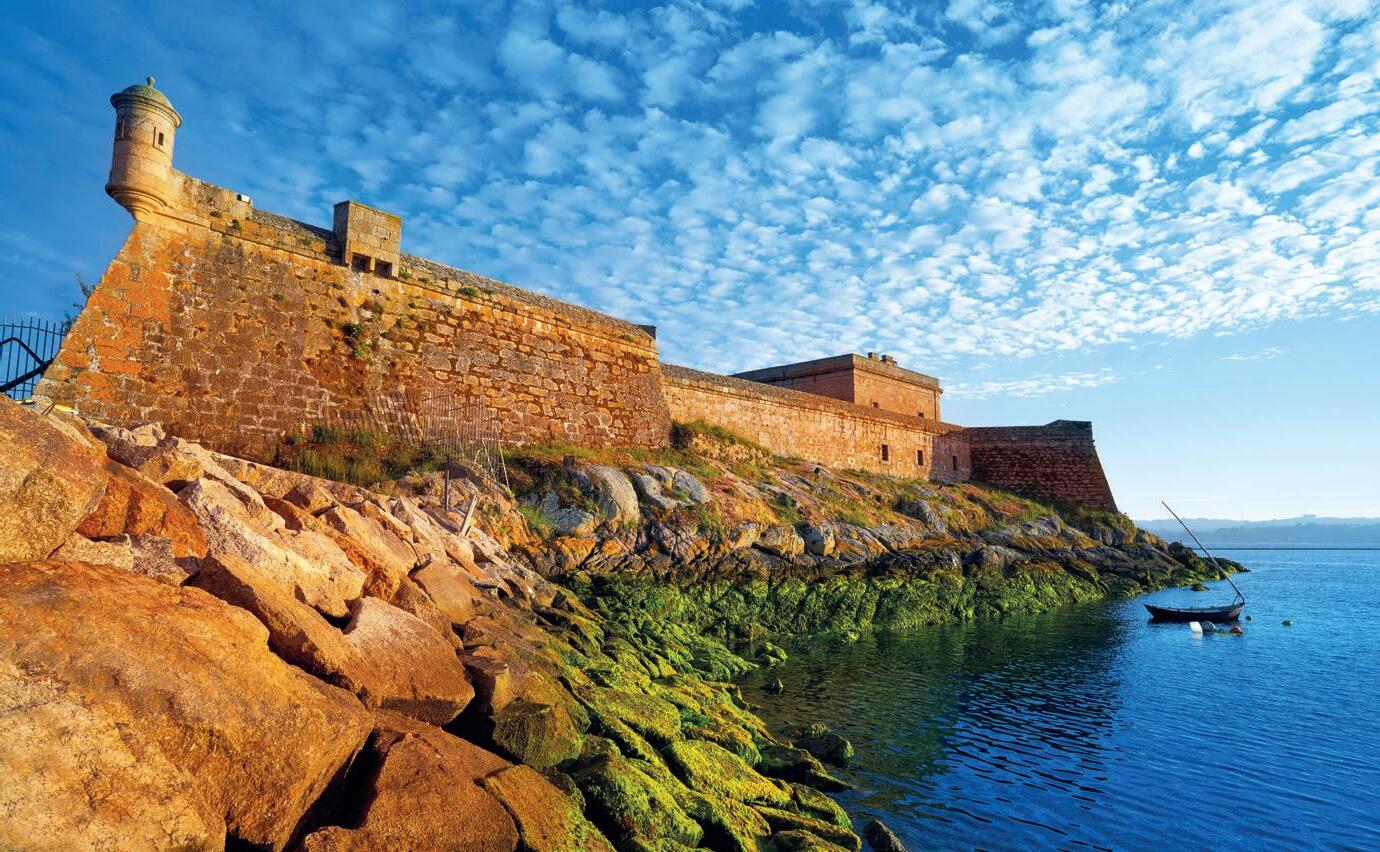




Among its urban beaches, Orzan and Riazor stand out – golden arcs of sand right in the city centre, perfect for a morning swim or an evening stroll.
A Coruña in Galicia is Spain’s seafood crown jewel
Culture lovers can dive into the Museo de Belas Artes, which houses Galician and Spanish masters, or the futuristic Domus Museum, dedicated entirely to the human body and designed by Japanese architect Arata Isozaki.
For families, the Aquarium Finisterrae brings the Atlantic indoors, complete

with its own resident seals.
If there’s one thing Clarkson truly missed, it’s the food. Galicia is Spain’s seafood capital, and A Coruña is its crown jewel. At the Mercado de la Plaza de Lugo, stall after stall groans with fresh catch – gleaming sardines,
lobsters, razor clams and the prized percebes, goose barnacles harvested at great risk from Galicia’s wave-battered ‘Coast of Death’. Many nearby eateries will even cook up your market haul on the spot.
No visit is complete without pulpo a la gallega – tender octopus cut into chunks, drizzled with olive oil and dusted with smoky paprika. Pair it with a glass of crisp Albariño wine from the Rias Baixas, and you’ve got Galicia on a plate.
For meat eaters, try lacon con grelos (pork shoulder with turnip greens), a hearty dish rooted in the region’s farming traditions. And to finish, the classic tarta de Santiago, the almond cake topped with the cross of Saint James, a nod to the pilgrims who’ve ended their Camino in this city for centuries.
Today, A Coruña is a city of contrasts: historic yet youthful, traditional yet buzzing with culture. Students fill the tapas bars of Calle Real, while pensioners swap stories in tiny taverns. Contemporary art rubs shoulders with centuries-old churches. And throughout, the Atlantic is never far away, shaping the rhythm of daily life.
For British travellers, direct flights make it easier than ever to reach. Yet A Coruña still feels undiscovered – a city where you can walk from a Roman lighthouse to a bustling fish market in half an hour. So Clarkson might have dismissed it. But for those who give it a chance, A Coruña reveals itself as one of Spain’s best-kept secrets: a city of glass, light, legends – and lobster.





JUST over a quarter of people in Spain don’t care or do anything about their sexual health according to a study by the Association for Health Self-Care (ANEFP).
The survey showed 26.3% of those questioned do not follow any kind of self-care practices and that figure rises to 41.5% for people aged 56 years and over.
The ANEFP study revealed that 40.6% of respondents believe that open communication with their partner is vital to maintaining good sexual health. In regard to contraception, 24.4% of males used a condom, while 12.1% of females took precautions.
Just 8.8% of those surveyed acknowledged that they test for sexually transmitted diseases as a self-care practice.
A NEW study suggests beta-blockers offer no benefit to most heart attack survivors.
Traditionally prescribed to protect the heart, these drugs, which slow heart rate and force, appear unnecessary for patients with uncomplicated heart attacks.
Researchers at the Centro Nacional de Investigaciones
Cardiovasculares (CNIC) say around 70% of survivors retain normal heart function, meaning daily beta-blocker use may be redundant.
Lead investigator Borja Ibanez called the findings ‘a paradigm shift’.

A RECORD 2,177 people in Spain died from heat-related causes in August.
That's a 71.3% increase on the same month in 2024 according to the Daily Mortality Monitoring System (MoMo).
The August total was
1,117 higher than in July and since the beginning of June, Spain has reported 3,644 heat deaths, 84.3% more than last year. The highest fatalities last
month were in the second and third weeks, with 934 and 862 deaths respectively.
Women accounted for 1,300 deaths in August and the majority of deceased were aged over 65 years (2,099) and of those, 1,428 were over 85 years old.
EXPERTS have warned about the risk of going on ‘miracle diets’ after the summer holidays. The Valencian College of Dieticians and Nutritionists says serious issues can arise from quick and substantial weight loss.
That includes cardiovascular damage and muscle degeneration plus nutritional deficits. It says crash diets are mainly characterised by promising rapid weight loss by restricting food groups or nutrients or or simply based on eating a single type of food.
Well-publicised diets include detox methods which base food intake on drinks and
By Alex Trelinski
shakes that promise a ‘purifying effect’.
There are also excess hypo-caloric diets which reduce calorie intakes at the expense of eliminating entire categories of beneficial foods, and mono-diets where people consume just a single type of food.
Valencian nutritionist, Natalia Gil said: “All of them generate large deficits in the body and serious health problems.”
“If you go on a diet without the advice of a registered expert, we deprive our body of the basic nutrients that our organs
HUELIN Park in Malaga has been closed after around 20 dead birds were discovered over the weekend, sparking fears of an avian flu outbreak just days after the disease
SPAIN’S jobless total rose by 22,000 in August to stand at 2.4 million - the lowest August figure since 2007.
The end of the high summer tourist season and cuts in staff working in education are behind last month’s increase.
The number of people registered with Social Security fell by 200,000, meaning that Spain’s official workforce stands at 21.6 million.
It ends a sequence of eight consecutive months when there were increases in Social Security registrations.
It was the biggest August fall in the registration total since 2019 and is an indicator that the country’s labour market still has a strong seasonal element to it.
Nevertheless, the government is keen to point out that the trend is very much in the right direction.
The Social Security Minister, Elma Saiz, said: “The labour market looks favourable with remarkable figures in both quantity and quality of employment.”
‘Miracle’ diet warning over sudden weight loss

and systems need to function properly,” she explained.
“This brings with it a greater cardiovascular risk and alter-
was confirmed in Sevilla. The closure came into effect following the discovery of dead ducks, coots and seagulls in the popular park's lake area. Samples have been sent for testing with results expected in the coming days. ations in kidney and liver function, as we notice more fatigue and an accelerated loss of muscle mass.”
“We can also suffer metabolic alterations and a greater risk from


chronic diseases such as diabetes,” Gil added.
According to the Valencian College, three out of four people who come to see one of their members had previously tried a magic diet.
“Social networks are the main source of information when looking for this type of food practices,” commented Gil.
“In them we find diets that go viral and that unfortunately are not promoted by health professionals.”
CASES of food poisoning in Malaga province dropped dramatically last year according to latest figures - but there is still a long way to go. The province recorded 192 cases in 2024, down from nearly 500 the previous year, according to the Regional Health Department. There were 26 separate outbreaks, five more than in 2023, but no deaths, and just four people required hospital treatment.
Health officials say that while any outbreak is serious, Malaga is doing well compared to the rest of Andalucia. There were 274 outbreaks in the region, so less than 10% happened in Malaga province, despite it being one of the most populous provinces with a very busy hospitality sector.
Salmonella was the most common culprit, responsible for 60% of confirmed outbreaks. The majority of cases – 81% – occurred in public eateries, where tracking exactly who consumed the contaminated food is difficult. The rest took place in homes or at events such as weddings, communions, or care homes. The main offenders were eggs (in all forms, including mayonnaise), meats, and sauces. Experts highlight that poor food storage, sloppy handling, cross-contamination, and preparing food too far in advance are the key causes.
FREELANCERS in Spain are finally seeing their pensions climb above the €1,000 threshold, after years of lagging behind salaried workers.
According to new figures published on Tuesday by the Social Security ministry, the average retirement pension for the self-em-
By Adam Husicka
ployed has reached €1,010/ month in August, paid in 14 installments.

Across: 6 Bavarian, 8 Clad, 9 Letter-writer, 10 Strad, 11 Teeming, 14 Optimum, 16 Among, 19 Machine tools, 21 Alum, 22 Ice sheet.
Down: 1 Pastrami, 2 Piers, 3 Gnarled, 4 Scat, 5 Warren, 7 Agent, 12 Mammoths, 13 Tunisia, 15 Pimple, 17 Nolte, 18 Beset, 20 Come.
This marks a record high and confirms a steady rise since January, when the average first crossed into four digits.
Until recently, most self-employed

workers paid into the system based on the minimum threshold, leading to significantly lower pensions compared to salaried employees.
Under the reformed model, in effect from 2023, contributions are now tied to real declared income, with the first payment adjustments taking place in 2025.
The change has triggered faster pension growth for freelancers than for employees - 5.3% in the last year compared to 4.7% for salaried workers.
Spain’s overall pension expenditure also hit a record high, reaching €13.6 billion in August to cover over 10.3 million benefits - a 6.1% increase year-on-year.
The rise reflects not only automatic pension revaluations and inflation-linked boosts but also higher earnings histories of new retirees.
Looking ahead to 2025, more reforms are on the horizon, including a cut in the standard working week, mandatory digital time tracking, a 5% hike in minimum wage, extended parental leave, and greater protections for interns.
SPAIN has lost out on a massive €45 billion submarine contract, after Canada rejected a bid from Spanish stateowned shipbuilder Navantia. Instead, Canada’s government, now led by former Bank of England governor Mark Carney, has advanced with proposals from Germany and South Korea to upgrade its submarine fleet. The blow came despite intense lobbying by Spain’s finance minister Carlos Cuerpo, who flew to Canada last October to push Navantia’s case with then-leader Justin
Trudeau. Navantia’s S-80 submarines reportedly failed to impress Canadian military officials due to lacking an air-independent propulsion (AIP) system - a feature included in Germany’s Type 212CD subs. India also rejected the S-80 for similar reasons, citing outdated technology.



For Expats based in Málaga
Key Insights:
• Inheritance Tax Changes & UK Pensions
• Smart Investing for Spanish Residents
• Strategies for Volatile Times
October 3rd 2025
9:30am - 12:30pm followed by a complimentary lunch
Why Choose AnyTech365?
Comprehensive Cybersecurity
SALLÉS HOTEL MÁLAGA CENTRO Mármoles, 6 · 29007 Málaga
Their services include cybersecurity, device maintenance and performance optimization, and malware removal, enhanced by AI for faster and accurate solutions.
Personalized User Experience
AnyTech365 adapt its product and technical support solutions to individual needs, offering a safe online experience to any user.



Some of AnyTech365 Products and Features
AnyTech365 IntelliGuard
AnyTech365

EVER had a chat with a friend about a dream vacation or a fabulous new pair of shoes, and then, like magic, an ad for it shows up on your phone?
World
AnyTech365
It feels spooky, like your phone’s been secretly listening in. But before jumping to conclusions, let’s take a closer look at what’s really happening behind the scenes. You’re definitely not alone in noticing this kind of thing. Many people experience that eerie moment of thinking, “Wait, how did my phone know?”. It’s easy to assume your phone is spying on you, but the truth is a bit more technical. While your phone isn’t wearing a trench coat and sunglasses, it is collecting and analysing a lot of data.
anytime,
Think of it as a digital psychic: it watches where you go, what you search for, what you click on, and even how long you pause on that adorable cat video. That information gets crunched by advertising algorithms powered by artificial intelligence, which then deliver ads that feel incredibly personal. It’s not magic: it’s modern marketing at work.
AnyTech365
or night, with AnyTech365’s around-the-clock support services, offered in more than 15 native languages.

Now, let’s address the common fear that your phone is actually listening to you. Voice assistants like Siri, Alexa, and Google Assistant are always passively listening for their wake words, but they’re not secretly recording every word you say. That said, there have been rare but real instances where these devices mishear something and begin recording by mistake. It doesn’t happen often, but it does remind us that privacy isn’t something to take for granted. That’s why experts always suggest checking your device settings from time to time.

bit too ‘watched’, you’re not powerless. There are several steps you can take to safeguard your digital privacy. Start by reviewing your phone’s microphone permissions and disabling access for any apps that don’t genuinely need it. If you rarely use voice assistants, it’s completely okay to turn them off. You might also consider clearing your voice assistant history regularly. It’s like spring cleaning for your phone. And be cautious with the apps you download.
If a flashlight app wants access to your microphone or contacts, that’s a major red flag. Stick to reputable apps and developers that respect your privacy. While it’s true your phone isn’t spying on you in the way movies might suggest, it is collecting a surprising amount of personal information. That can feel invasive, but the good news is, you’re in control. By making a few smart changes to your settings and being more mindful about your app choices, you can enjoy your tech

If you’re starting to feel a

without feeling exposed. Because at the end of the day, technology should work for you, not make you feel uneasy. And if you ever need help navigating your privacy settings or just want peace

of mind, the friendly experts at AnyTech365 are here to help you stay smart, secure, and confident. Grab our exclusive FREE introductory offer below and call AnyTech365 to leave it all to the experts!





A RECKLESS driver in Malaga smashed a stolen car into a police vehicle after a high-speed chase through the Guadalhorce estate. He fled on foot but was later arrested.
BARCELONA’S Sagrada Familia is offering 20,000 free tickets during La Merce festival, September 19–24. Normally €30, entry will be via online draw closing September 14.
A 40-year-old delivery driver was seriously injured in Playa del Ingles, Gran Canaria, after a pallet of beer barrels toppled onto him. Firefighters freed him before paramedics rushed him to hospital.
A BRITISH expat has been accused of hypocrisy after stating she moved to Spain because ‘there’s too many foreigners in the UK’. The comments, made in an interview with conservative British broadcaster GB News in Benidorm, have been met with criticism on social media - with some
By Walter Finch
users saying: “You really couldn’t make this up!”
Asked by GB News reporter
Dougie Beattie to explain why she moved to Benidorm permanently, the unnamed lady replies: “You’ll probably edit it out because
SPAIN has been crowned the baldest nation on earth, with a survey finding 44.5% of men suffer from male pattern baldness. That’s higher than anywhere else in the world – edging out Italy (44.3%) and well above France (42.2%) and the US (42.7%). Germany also made
there’s too many for eigners in the UK.”
British expat mocked after revealing ironic reason for moving to Benidorm
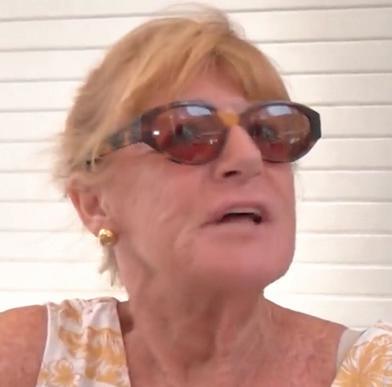
“We lost our rights, freedom of speech went!’ she adds, before declaring: “Britain lost the plot 20 years ago, sorry!”
The lady’s friend then chimes in to have a pop at the current British government, describing Sir Keir Starm-
the top five with over four in 10 men balding. Britain wasn’t far behind, with 40.1%, while neighbouring Ireland (38.7%) and Portugal (33%) fared better. The survey revealed a stark global divide: men in Europe, North America and parts of the Middle East are far more likely to lose their locks, while those in Asia, Africa and Latin America keep their hair for longer.
er’s Labour administration as ‘crap’ and ‘the worst government ever’. The comments were slammed by social media users who were keen to point out
the irony of someone complaining about foreigners in their home country, only to become one themselves.
“Too many foreigners in the UK says the foreigner in Spain,” said one user on X
“Good to see they’re enjoying life in Spain, which is run by a Socialist Workers Party government!” gibed another user.
“Such minds gave us Brexit,” added David Head, a translator and writer.
Benidorm is one of the most popular destinations for Brits seeking some Spanish sunshine.
The city is home to almost 3,500 British residents, representing around 5% of the population, while more than 900,000 British holidaymakers paid a visit last year.
A CASH machine stunned passers-by when it began spitting out bank notes late at night. The bizarre malfunction saw a shower of €10, €20 and €50 notes scatter across the pavement in Torre Pacheco, Murcia –despite the fact that no one was using the ATM at the time.
Fortunately for the bank in question, the first person to come across the unexpected bonanza was a very honest neighbour. This Good Samaritan immediately called the Policia Loca and in the meantime started gathering up the billowing notes. Not a euro was lost with police recovering €2,000. The next morning bank staff explained the cash had been deposited just minutes earlier.
